#han ji yul
Text
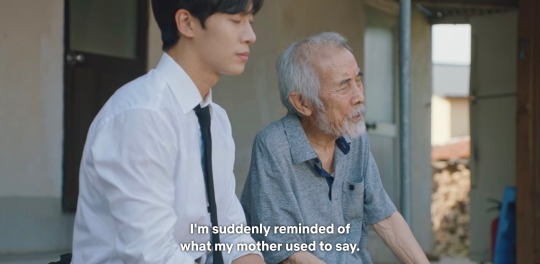
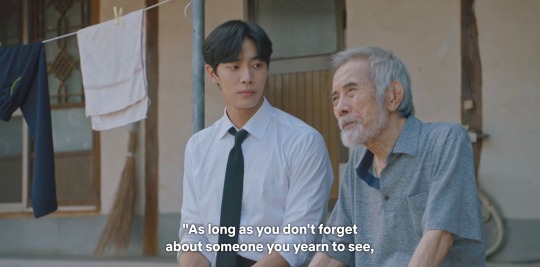

ONCE UPON A SMALL TOWN (2022)
#once upon a small town#once upon a small town kdrama#ahn ja young#han ji yul#ahn jayoung#han jiyul#ahn ja young x han ji yul#han ji yul x ahn ja young#choo yeong woo#choo yeongwoo#joy#baek sung chul#lee sang hyeon#rom com kdrama#romance kdrama#kdrama screencaps#kdrama stills#kdrama screenshots#kdrama#korean drama#favorite scenes
68 notes
·
View notes
Text
Upcoming Kdrama May 2024 💚
1/5: Frankly Speaking with Go Kyung Pyo, Kang Han Na. 12 episodes; rom-com.
4/5: the Atypical Family with Chun Woo Hee, Jang Ki Yong. 12 episodes, fantasy, romance, action.
11/5: the Midnight Romance with Jung Ryeo Won, Wi Ha Joon, So Joo Yun. 16 episodes; romance.
13/5: Crash with Lee Min Ki, Kwak Sun Young, Heo Sung Tae. 12 episodes; thriller, mystery, comedy.
13/5: Dare to Love Me with Kim Myung Soo, Lee Yoo Young. 16 episodes; rom-com.
15/5: Uncle Samsik with Song Kang Ho, Byun Yo Han, Lee Kyu Hyung. 16 episodes; business drama.
17/5: the 8 Show with Ryu Joon Yul, Chun Woo Hee, Park Jong Min. 8 episodes; thriller, psychological.
22/5: Not Very Strong, but Attractive Homicide Squad with Park Se Wan, Kim Dong Wook. 12 episodes; mystery, comedy.
24/5: Bitter Sweet Hell with Kim Hee Sun, Lee Hye Young, Kim Nam Hee. 12 episodes; thriller, mystery, comedy.
24/5: Connection with Ji Sung, Jeon Mi Do, Kwon Yul. 16 episodes; thriller, mystery.

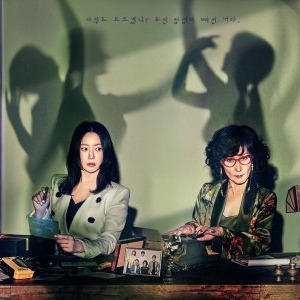
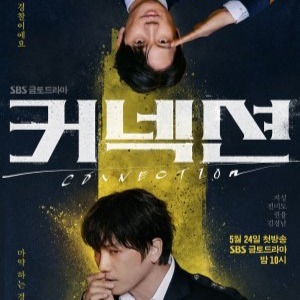
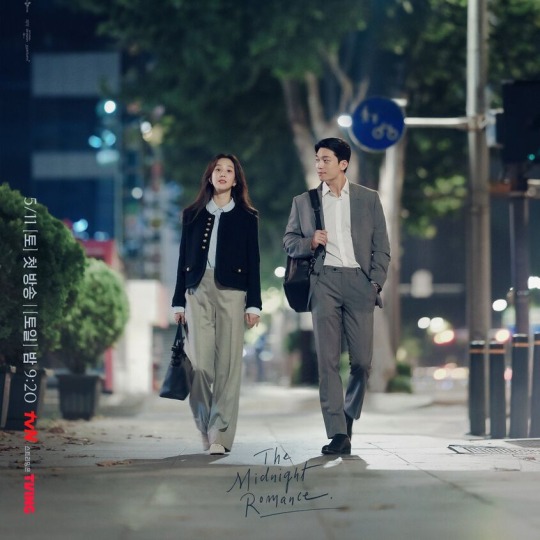
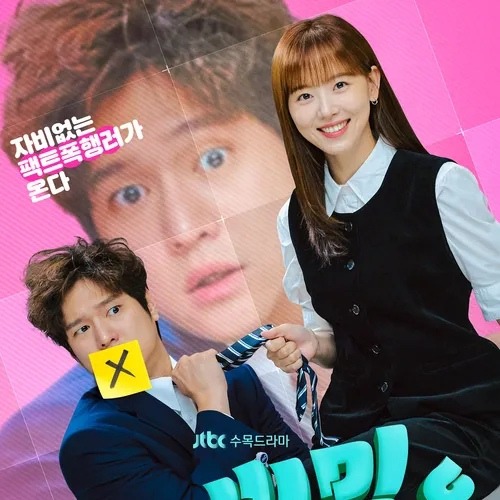
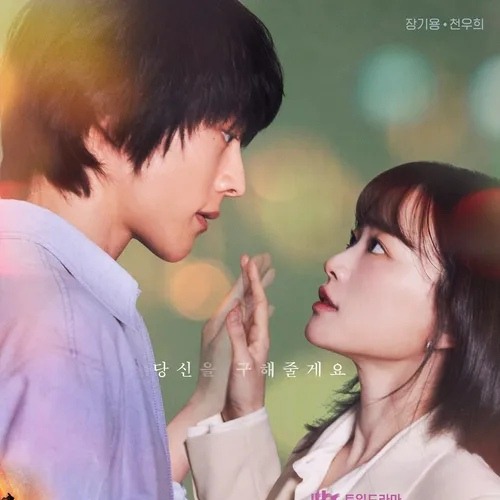
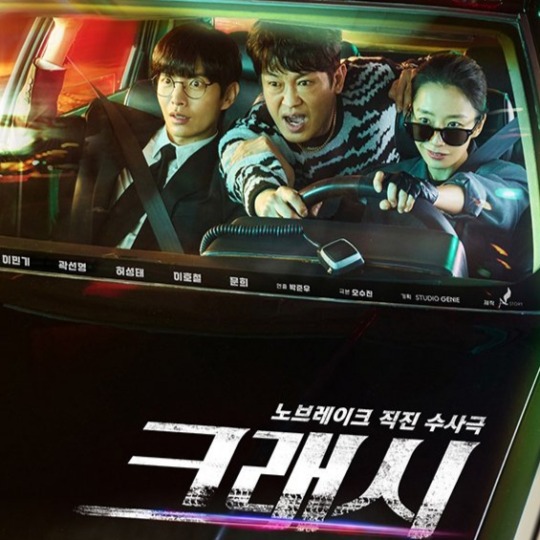
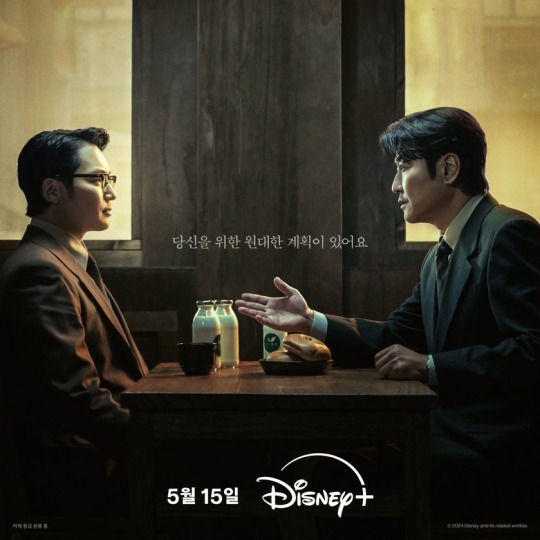
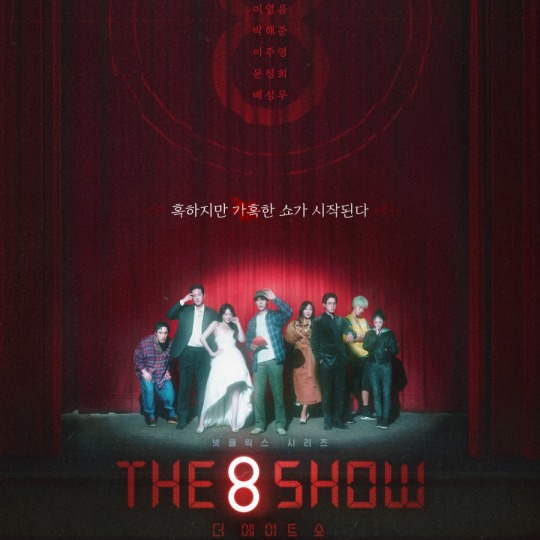
Many new dramas! And so little time...
#upcoming Kdrama#frankly speaking#the atypical family#the Midnight Romance#crash#dare to love me#uncle samsik#the 8 show#bitter sweet hell#connection#go kyung pyo#kang han na#chun woo hee#jang ki yong#jung ryeo won#wi ha joon#lee min ki#kim myung soo#song kang ho#byun yo han#ryu joon yul#ji sung#jeon mido
113 notes
·
View notes
Text
what is it with all of these married DILFs showing up in heavily queer coded roles recently. why did God tell them to do that for me
#tv: the devil judge#tv: sweet home#tv: vigilante#the devil judge#sweet home#sweet home 2#vigilante#vigilante kdrama#ji sung#kim mu yeol#kim moo yul#yoo ji tae#kdrama#local gay watches k-dramas.txt#Kang Yo Han. Cho Heon. Kim Young Hoo.#confession that i have not watched Sweet Home so that tag is based off of the gifs that flattened my ass last night but still#these are the shows that i can remember off the top of my head and we've got two bisexuals and one mlm leaning like what is this
140 notes
·
View notes
Text

MY SWEET MOBSTER
GENRES: Comedy, Romance
SUMMARY: A shy, reformed gangster-turned-CEO and a confident content creator reunite and become the cutest couple ever.
THIS SHOW HAS EVERYTHING: Cupcakes, sausages, animal dances, orphanages, Daddy issues, fluffy cats, professional rivals, romantic players, soccer players, impeccable suits, and earnest redemption.
HOT TAKE: From the interviews I've been reading with Uhm Tae Goo, it seems like he is juts as shy in real life as his role in this drama and I love that for him. A perfect fit!
This show is super corny and super trope-y, but also super progressive and really emphasizes earnest communication when it comes to love and friendship. At face-value it's not the kind of show that I really go for, but its totally worth throwing expectations aside for.
My only gripe is that the last episode was kinda meh, but not meh enough to ruin my time with the rest of it.
#my sweet mobster#uhm tae goo#han sun hwa#kwon yul#kim hyun jin#yang hyun min#lee yoo joon#moon dong hyuk#park jae chan#moon ji in#im chul soo#park chul min#korean drama#kdramadaily#kdramanetwork#kdramas#kdramasource#kdrama#hot take#hallyu
6 notes
·
View notes
Text
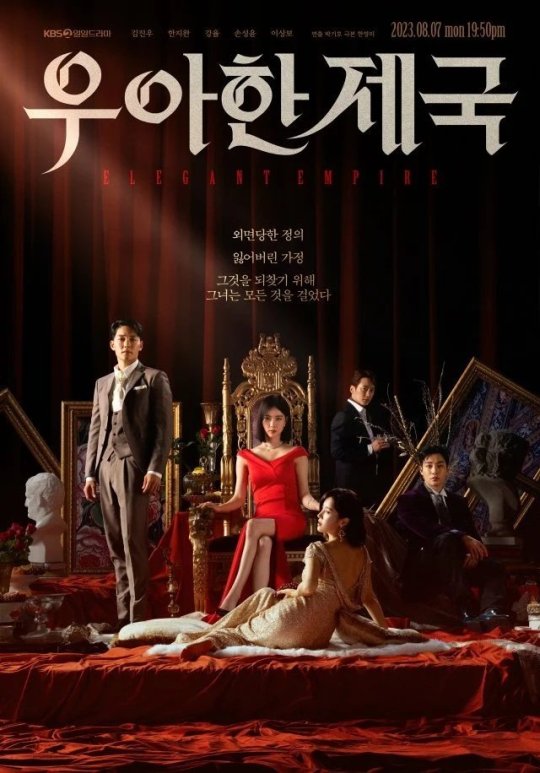
Elegant Empire (2023)
#elegant empire#kbs elegant empire#elegant empire kbs#kbs#2023#우아한 제국#한지완#김진우#강율#손성윤#이상보#han ji wan#kim jin woo#kang yul#kang yeol#son seong yoon#son seong yun#lee sang bo#instagram#kdrama
8 notes
·
View notes
Text
South Korean tv shows with lgbt* characters
Because so many people liked my post for german tv shows with queer characters, I thought I‘d compile lists for other countries as well.
A-Z
A First Love Story (2021) (mlm) | YouTube
Jaesung (Kim Hyeongwon)
Mingyu (Jung Jaewoon)
Blueming (2022) (mlm, wlw) | IQIYI
Hyeong Daun (Jo Hyukjoon)
Cha Siwon (Kang Eunbin)
Cha Siyeong (Moon Hyein)
Choco Milk Shake (2022) (mlm) | YouTube
Jungwoo (Ko Hojung)
Choco (Lee Jaebin)
Milk (Kim Seonghyuk)
Uncle (Park Seungbin)
Girlfriend Project Day 1 (2022) (wlw) | YouTube
Ahn Gain (Park Hyunwoo)
Song Heeram (Bing Hyejin)
His Man (2022-) (mlm) | IQIYI, Gagaoolala | reality tv
Season 1
Kim Changyu
Kim Seonyul
Jeon Eunchan
Lee Jeonghyun
Kim Changmin
Leon Hyukjun
Lee Hyeon
Hokeep
Season 2
Shin Sungho
Oh Minsung
Kim Yoonghee
DABIT
DAENYOL
Lee Junseong
Yang Hyunjin
Joon Seonwoo
Jazz for Two (2024) (mlm) | IQIYI, Gagaoolala
Han Taeyi (Ji Hogeun)
Yoon Seheon (Kim Jinkwon)
Seo Doyoon (Song Hangyeom)
Lily Fever (2015) (wlw) | YouTube
Kim Kyungju (Kim Hyejoon)
Jang Serang (Jung Yeonjoo)
Love Class (2022-) (mlm) | Viki, Gagaoolala
Season 1
Cha Jiwoo (Han Hyunjun)
Lee Roa (Kim Taehwan)
Kim Namjun (Yoo Hyukjae)
Season 2
Lee Hyun (J-min)
Shin Maru (Lee Kwanghee)
Oh Minwoo (Woo Hyowon)
Kim An (Kim Yongseok)
Yoo Joohyuk (An Jeonggyun)
Kim Sungmin (Jung Woojae)
Love for Love's Sake (2024) (mlm) | IQIYI, Gagaoolala
Tae Myungha (Lee Taevin)
Cha Yeowoon (Cha Joowan)
Chun Sangwon (Oh Minsu)
Ahn Kyunghoon (Cha Woongki)
Love Tractor (2023) (mlm) | IQIYI
Seon Yul (Do Won)
Suh Yechan (Yoon Dojin)
Kwon Inseo (Yang Seungbin)
Merry Queer (2022) (mlm, wlw, trans) | Gagaoolala | documentary
Kim Minjun
Park Bosung
Yoo Taeyoon
Lee Minju
Im Garam
Lee Seungeun
Our Dating Sim (2023) (mlm) | VIKI, Gagaoolala
Shin Kitae (Lee Seunggyu)
Lee Wan (Lee Jonghyuk)
Semantic Error (2022) (mlm, wlw) | VIKI, Gagaoolala
Jang Jaeyoung (Park Seoham)
Chu Sangwoo (Park Jaechan)
Choi Yuna (Song Jioh)
She Makes My Heart Flutter (2022) (wlw) | YouTube
Gangseol (Byun Jihyun)
Jung One (Park Somi)
Yubin (Choi Jiwon)
Sarang (Kang Nayoung)
Leera (Ahn Yeonsun)
The Eighth Sense (2023) (mlm) | VIKI
Seo Jaewon (Lim Jisub)
Kim Jihyun (Oh Juntaek)
To My Star (2021-2022) (mlm) | VIKI, IQIYI
Season 1 & 2:
Kang Seojoon (Son Woohyun)
Han Jiwoo (Kim Kangmin)
Our Relationship Ended Before It Began (2023) (wlw) | YouTube (only Ep 1 and 2 are available for free right now, but I still wanted to share this series (Link))
Yoonah (Park Hayoung)
Kim Ahyoung (Park Sanha)
Note: For this list, I decided not to add a symbol for shows that center queerness, because in a way all of these shows do that and at the same time almost none actually do. Queer characters and their love stories are featured in every show in this list, but most of them do not address any other queer aspects of their lives and only some address the fact that they are queer at all. This is not a critique of South Korean shows, but just an observation of their current media landscape and added as context, in case you are interested in watching.
#korean lgbt series#lgbt characters#mlm#wlw#lesbian#gay#bisexual#queer#A First Love Story#Blueming#Choco Milk Shake#Girlfriend Project#His Man#His Man 2#Lily Fever#Love Class#Love Class 2#Love Tractor#Merry Queer#Our Dating Sim#Semantic Error#She Makes My Heart Flutter#The Eighth Sense#To My Star#To My Star 2#korean bl#korean gl#love for love's sake#jazz for two
60 notes
·
View notes
Text
Solo Leveling werewolf AU!
If we have AUs such as Mafia and Vampire, why not Werewolf AU?
Other ideas are greatly appreciated!<3
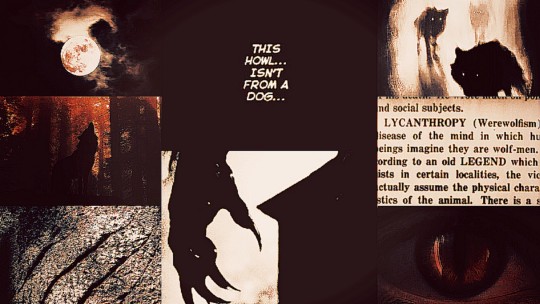
SHADOW BLOODHOUNDS
> led by Sung Il-hwan, the Alpha.
> werewolves with black fur are rare, so it's no surprise that Sung Il-hwan soon became the leader of the pack.
> the name "Shadow Bloodhounds" was originated from a family of werewolves, who had dark reddish-brown fur, and the shadow term came from how the members frequently lurked in the shadows for surprise attacks. And since Sung Il-hwan became the Alpha, plus his wolf form being a black wolf, the name became stronger and prominent.
> Sung Il-hwan's son, Sung Jin-woo, is the Beta. Like his father, his wolf form also has a black fur. This became a big shock to the entire pack, especially when they saw their Alpha's son transform for the first time.
> before becoming the Beta when he reached 20, Sung Jin-woo had to fight the former Beta — as per tradition among all wolf packs. Despite being the "weakest" due to his birth, Jin-woo managed to win by sheer determination and since he became his father's second-in-command, he became stronger overtime.
> if he's not doing any werewolf duties, Sung Il-hwan runs a fire department, which he also works as a firefighter. He also holds urgent meetings in the station once everyone else is out. Sung Jin-woo, however, has chosen to be a detective rather than a firefighter like his father.
> Jin-woo is secretly the only member in the pack who has killed a human. Although, he never tells it to anyone.
> known members: Park Kyung-hye, Sung Jin-ah, Yoo Jin-ho, Yoo Soo-hyun, Lee Ju-hee, Han Song-yi, Kang Tae-shik, and Kim Sang-shik.
CRIMSON FANGS
> led by Choi Jong-in, the Alpha.
> unlike Sung Il-hwan, Choi Jong-in came from a heritage of Alphas and Betas. His father was an Alpha and his mother was a Beta. Thus, they led the pack together, as well as running a law firm, which soon fell into Jong-in's hands when he took his rightful place in the pack.
> for his Beta, Jong-in chose Cha Hae-in, who is his close friend since childhood. But not only that, she's also the fastest wolf in the pack and has the strongest smell, so it'll make sense of why he picked her of all strong werewolves in the pack.
> even though a werewolf's eyesight is sharp, Jong-in wears his glasses to shape himself into being a human. But when he's in his wolf cycle, his eyeglasses are taken off as they might break during his transformation.
> when there's a wolf cycle, it's also hunting season for the werewolf packs. Jong-in and Hae-in plot the strategy and divide their pack into two, sometimes three if their target is a larger herd.
> known members: Song Chi-yul, Son Ki-hoon, Gina, Seo Ji-woo, Lee Bora, and Han Se-mi.
RAVEN HOWLERS
> led by Lim Tae-gyu, the Alpha.
> usually, whenever there's a large flock of ravens, all of the Raven Howlers are gathered. Ravens also serve as the Eagle Eye of the pack, alerting the Alpha if anything dire happens.
> Ma Dong-wook used to be the Alpha, but due to some unforeseen circumstances, he stepped down and switched places with Lim Tae-gyu, who was the Beta at that time.
> during the wolf cycle, the entire pack will howl under the bright full moon whilst the ravens swirl in the air. It is a tradition for summoning more luck in the pack.
> while most wolves don't like to have birds resting on them, Tae-gyu happily lets the ravens rest on his fur however as they want, especially in winter.
> Tae-gyu also relies on Eun-seok, who serves as his "back-up" since he's quick to lunge into action or if someone is going to attack the Alpha from behind.
> known members: Eun-seok, Jung Ye-rim, Lee Min-sung, and Park Jong-soo.
BERSERK CLAWS
> led by Baek Yoon-ho, the Alpha.
> some believed that Yoon-ho came from a lineage that bore strong connection to Rakan.
> Yoon-ho is a fierce werewolf, lethal in his heavy claws. He's one of the biggest werewolves when transformed, but even in his human form, he can crush a head with his own bare hands.
> Park Hee-jin is his chosen Beta. She's a she-wolf with an impeccable sense for danger, she reads the situation quick and carefully, and her guts are as sharp as her mind. She's able to tell when a situation is not good and informs her leader firsthand before forming her own strategy.
> Min Byung-gyu, Yoon-ho's best friend, had once been offered for the rank of the Beta. However, he rejects it as he doesn't think leadership is his forte. And even then, he's one of the strongest wolves and protects his fellow members.
> Yoon-ho has a reputation of killing his own kind, making him fearsome that even some of his members are cowering on him.
> while the rest work in teams, Yoon-ho usually hunts alone as his strength is merely for taking down large animals.
> known members: Kim Chul and Ahn Sang-min.
CRESCENT GUARDIANS
> led by Go Gun-hee, the Alpha.
> Woo Jin-chul is his second-in-command.
> like black-furred werewolves, white-furred werewolves are also rare. And Go Gun-hee is the oldest living white-furred wolf, as well as the oldest active Alpha when most would retire before reaching his age.
> Go Gun-hee doesn't always go for action, mainly because he's looking after his strength, so he relies on his Beta for the task.
> Go Gun-hee is the most respected Alpha besides Sung Il-hwan.
> they're the only pack who has been recognized by other packs outside the country.
> Woo Jin-chul once took down an entire group of rogues, showing his formidability after they attempted to raid the pack.
> known members: ————
Other notes:
— pack wars are a thing, though not as frequent unlike decades ago.
— it is believed that Rakan, a beast entity who can turn into a human, had started the race by cursing several humans to continue his legacy and increase population.
— there are werewolves called 'Rogues' — it's when a werewolf is banished from their pack.
— there are certain outfits/fabrics that don't get ripped apart when shifting, rather they just disappear in the process.
— during the wolf cycle, all packs run to the mountains for camping — some build their own little houses deep in the woods, far from the human civilization. It is a coincidence if they stumble upon other packs.
20 notes
·
View notes
Text





Seo Jin Ah, Heo Yoon Mi, Han Ji Eun, Kim Ha Yul & Park Soo Yu
#SeoJinAh HeoYoonMi HanJiEun KimHaYul & ParkSooYu.#underwear.#krgirls.#SeoJinAh HeoYoonMi HanJiEun KimHaYul & ParkSooYu underwear.
13 notes
·
View notes
Text
Here’s a list of all the Kdramas/Korean movies that I watched in 2023 + some of my thoughts (spoiler free)
The Glory
-Gonna be honest, I only started watching because Kim Hieora and Jung Sung Il are in this show.
-But I ended up really liking it. The bullying scenes were horrifying, the characters were memorable, and overall it was very well made.
Stranger
-HWANG SIMOK! I love him so much! BAE DOONA! I love her so much!
-I loved all the characters and all the twists
Stranger 2
-This season was good too. Seeing the dynamics and relationships between all the characters change was so interesting
Unlocked
-IM SIWAN! The reason why I watched this movie <3
-Is it the best and most unique movie? No. Was it pretty good and entertaining? Yeah!
All Of Us Are Dead
-Even in the zombie apocalypse they’re not free of bullying.
-My heart broke many times. Those poor kids didn’t deserve to go through all of that! (Except Na Yeon. I still don’t like her.)
The Glory Part 2
-Not the typical type of revenge. But I think it’s a very fitting ending.
Physical 100
-This show inspired me to start taking better care of myself.
-Watching everyone hype up this show so much then watching all the controversies come out in real time was crazy. Looking forward to season 2
Kingdom
-This show was on my radar because that zombie dude from Physical 100 said he did the choreography
-I love all of the characters and the zombies were so freaky
Kingdom 2
-The Queen might’ve been the scariest part of this show
-I love this show, season 3? Maybe?
Kingdom: Ashin of the North
-Han Ho Yeol from DP?!?!
-It was really interesting seeing another side to this story
Silent Sea
-BAE DOONA! GONG YOO!
-I don’t understand why this flopped. I really liked this show!
Siren: Survive The Island
-I was team athlete til the end! (I thought Kim Seong Yeon was hot)
-If there isn’t a season 2 I’m going to fight Netflix
Misaeng
-Im Siwan <3
-I really like this show. It really gave me hope and it honestly inspired me to work harder. I’m also trying to learn to play baduk
D.P. 2
-So many emotions. The ending left me feeling a bit empty. I’ve grown so attached to these characters and now it’s just over.
The Wailing
-I think I need to watch this a second time to really analyze it.
-I really like the sfx makeup
Monster
-Accurate representation of neurodivergent people/mentally disabled people? No.
-Interesting villain and fight scenes? Yes
Hide and Seek
-I really liked the twist and how eerie the vibes were
Memoir of a Murder
-I love unreliable narrators. Not knowing what’s real and what isn’t really puts you on the end he of your seat
-Also I didn’t even realize that was Kim Nam Gil
The Policeman’s Lineage
-I only watched this for Kwon Yul
-Decent story but I feel like it fell short of its potential
Hansel and Gretel
-Solid start but I didn’t realize that it was going in the direction that it did
-Not the ending that I expected but I’m satisfied with it
Ballerina
-Honestly, they were so over dramatic when it came to the bdsm stuff. Like okay, he’s kinky. That’s the least concerning thing about him.
-My mom got me to watch this because she likes Kim Ji Hoon
The Mimic
-Interesting concept with interesting characters
-The ending was so fitting, I’m very satisfied with it
Champion
-Another movie I watched for Kwon Yul
-I really like this movie, it’s very comforting and funny
Mother
-This is a cautionary tale, you cannot tell me otherwise!
-I was SHOCKED! It was just so sudden. I don’t know how to explain it without spoiling what happened.
Sweet Home 2
-Interesting. I’m not sure what I expected from this season but this wasn’t it.
-I found it entertaining but I’m not quite sure if I like how they’re approaching this new thing that they’re doing.
#bob is talking#kdrama#the glory#stranger kdrama#unlocked#all of us are dead#physical 100#kingdom kdrama#the silent sea#siren: survive the island#misaeng#dp kdrama#the wailing#monster 2014#hide and seek 2013#memoir of a murderer#the policeman’s lineage#Hansel and gretel 2007#ballerina 2023#the mimic#champion 2018#mother 2009#sweet home
25 notes
·
View notes
Text
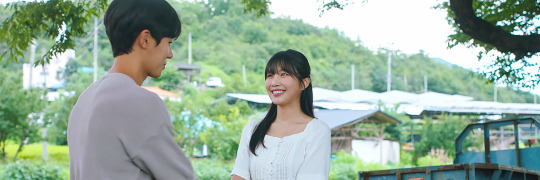

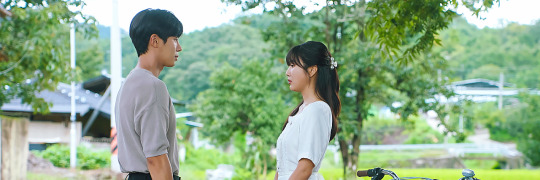

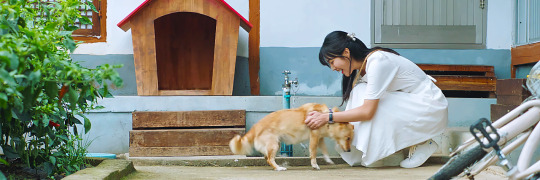
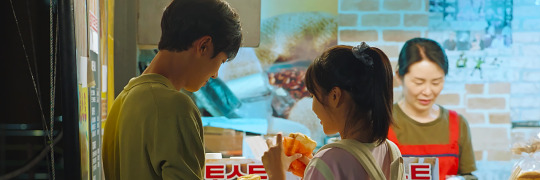
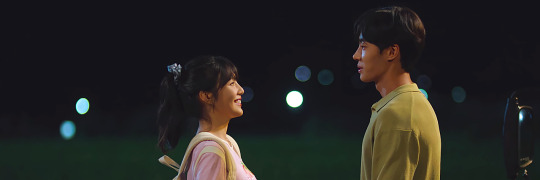
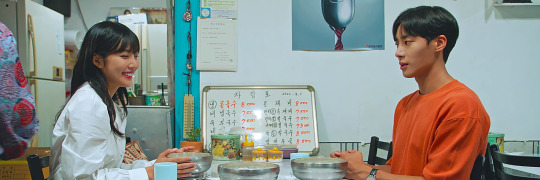

Ahn Ja-yeong & Han Ji-yul — Once Upon a Small Town, 2022.
#headers#once upon a small town#ahn jayeong#han jiyul#ahn x han#park sooyoung#choo young woo#joy#once upon a small town headers#kdrama headers#dorama headers#park sooyoung headers#choo young woo headers#joy red velvet#couple headers#green headers#aesthetic headers#random headers#twitter headers#tv shows headers#tvshowsedit#coral
138 notes
·
View notes
Text
& turn the tower did
Kuwei Yul-Bo grows up like every other child in Shu Han: with the knowledge that to have power is to be a miracle, acknowledged and praised by the Tabans themselves. His father, Bo Yul-Bayur, is lauded as Shu Han’s greatest, the uncrowned king of the royal labs, and Kuwei wants nothing more than to be like him. But when the appearance of Ravka’s new Sun Summoner sparks a nation-wide testing spree in Shu Han, Kuwei quickly discovers that the price of miracles is not one he’s willing to pay.
Or: On being more and less than human in a country that would devour you whole.
Word count: 16.8k
Fandom: Six of Crows; minor references to The Lives of Saints and The Grisha Trilogy
Note: so pleased to have written this kuwei backstory for the @grishaversebigbang this year! it was an honor to have art made by @fricklefracklefloof (x), @kuwei-yul-arson (x), @doorhandle16 (x), and @soupdreamer (x), and to be beta'd by @poeticor (whose banger of a fic is available here). best gang fr!
this is cross-posted to ao3 but you can read it under the cut!
In the time before the six nations came to be, when they were less than soldiers gathered under one banner, when they were simply ideals and nothing more, tales of powerful individuals spread far and wide. They crossed land and ocean and, some liked to say, reached the heavens, though at first they were dismissed as rumors of madmen seeking to sow chaos. What else would a rational individual accept? Power is only safe to trust when you hold it in your hands. Easier, then, to doubt stories than to confront an uncontrollable reality.
But doubt does not change the truth.
More and more evidence rose, from all corners of the world, and soon it was fact that such magics existed. That those who wielded it were capable of feats no ordinary person could achieve: they could call on wind and lightning, sea and flame; they stopped hearts just as swiftly as they compelled them to beat; they made unbreakable blades such that one could triumph against a ten thousand-strong army.
Some said they were more than human.
(Some said they were less.)
Ravka dubbed them Grisha in honor of a Saint who would become the first teacher of their fabled Second Army. Fjerda named them drüsje, witch, and set to eliminate their unholy sorcery from the world. Kerch saw what it could stand to gain from such power, and so they were known as the winstgevend, the profitable. Blighted by sickness in the body and land, in the Wandering Isle, they were welcomed and hailed as slánaitheoir, saviors.
In Shu Han, they were called sheng ji. Miracles; holy relics.
No one knew where the first sheng ji came from, only that they brought blessings wherever they went. In those days, Shu Han was little more than a dozen villages scattered across the land, each one eking out a peaceful life. Peace, then, was sustained by power, by protection. In those days, sheng ji were the deciding factor between affluence and ruin, conflict and security.
Some could call on the sea and wind, while others could summon flame. Some were masters of fate, cradling life and death in their hands, while others crafted marvelous inventions, that their people would know an age of prosperity. Little by little, a settlement of a handful of families turned to villages turned to walled city-states. And so the sheng ji were named as such, for much of their effort contributed to each city’s success, and they were beloved of their people, for they brought blessings when sometimes none could be found.
The most famous of the sheng ji became Saints: Sankt Kho of good intentions, for the clockwork soldiers he created to defend his people, and Sankta Neyar of blacksmiths, for a sword she forged that could cut through shadows and laugh at steel. It was their actions that paved the way for the first queen of what would become Shu Han, the Taban yenok-yun, the storm that stayed. And so the sheng ji, who were known as miracles, became known as holy, though not all were Saints, and were venerated throughout the land as such. The sheng ji then entered the service of the Taban queens and pledged to bring miracles to Shu Han forevermore.
That was the story that stayed. Like all children of Shu Han, Kuwei grew up listening to it, believing it. He wanted to live it, too. But Kuwei would come to learn, as all the sheng ji before him once did: it was one thing to know a story.
It was another entirely to know the truth.
Kuwei knew there was something going on, because everyone was either too loud or too quiet. Or, at least, everyone was too obvious about their secrets because they’d stop talking about it if they saw him approaching.
But it was the adults specifically who were hiding this secret, because none of the children on his street knew what they were talking about. The whole morning, there had been whispering tongues, and not one of them belonged to his friends. It was weird: new stories always got to them somehow, so it meant the adults were hiding it on purpose.
Usually, they weren’t very good at that. It was annoying that they decided to be today.
That was okay. Kuwei knew he was better.
Kuwei’s Mama and Baba were out for the day — Baba had to go to work, and he was frowning in a way that really did mean something was wrong, because Kuwei had never seen Baba look so unhappy before. He didn’t know if Baba being upset had anything to do with the secret nobody wanted to talk to him about, but he knew that Baba did really important work, so maybe he did. Mama was at the docks, preparing for her next trip to Kerch; she didn’t seem happy to leave either of them that morning, right when Kuwei first started seeing the gossip, and though she never did, looking back Kuwei thought that maybe Mama knew, too. Maybe they both did. They’d definitely hear about it at work.
They weren’t around for him to ask, but Kuwei’s Yeye and Nainai were visiting, anyway, so he tried his luck with them during lunch.
“Where did Baba go?” he asked them, as his Nainai dumped hei jiao ji ding on his plate.
“Your Baba is a very busy man,” Nainai replied. “He had to finish important work today.”
“What kind of work?”
“He’s a sheng ji,” Yeye said, with an edge to his voice Kuwei always hated: it made him think he never knew enough, and that Yeye was looking for something that wasn’t there but should’ve been. Baba told him that it was because Yeye knew so much and was very wise, so sometimes he forgot that he was so smart that others could have a hard time keeping up sometimes, but Baba himself made interesting expressions when Yeye spoke to him like that, which happened a lot.
“What do they do?” Kuwei asked. Baba could make medicines that made Kuwei hurt less, when he got sick, and he always helped their neighbors, too, when they asked — that was what being sheng ji meant. Was there more?
Yeye made a quiet sound that sounded a little mean, then explained, still with the edge Kuwei hated. It was a long few minutes of him just saying things; Kuwei sometimes wondered if no one could keep up with Yeye because he kept rambling, not because he was too smart for everyone else.
Being sheng ji sounded… complicated. Or maybe Yeye was just making it sound complicated. From what Kuwei gathered, they helped the people of Shu Han and they worked for the Taban family, which, on reflection, was simple enough to understand but that didn’t change the fact that something happened today. His Yeye and his Nainai rarely came to visit, after all, so there must’ve been a reason for them to be here. If it had anything to do with Baba, Kuwei wanted to know.
When he tried asking about it, Nainai’s mouth pressed into a thin line and she piled more rice on his plate. Yeye said he was too young to know or understand — it was an adult’s business, not a child’s.
So there was something. Something they did want to hide from him. But eight was old enough! Maybe not old and wise, like his Yeye was, because no one could ever match yeye’s wisdom, according to Baba, but Kuwei could still understand everything he needed to. Nobody needed to hide anything from him — he’d get it.
Still, Kuwei already knew when he could keep pushing, and he didn’t see a good opportunity now. Baba always told him Yeye and Nainai were strict, after all, and Kuwei figured that Baba knew that better than him, what with a lifetime of living with them.
So after lunch, Kuwei excused himself to go play outside. Yeye scoffed; Nainai waved him out with a stern reminder to be back before night, or he wouldn’t get any red bean shaobing.
Kuwei learned more on the street than he did from his grandparents. There were so many people talking that it was just so hard to choose what to listen to first! They went quiet when they noticed him approaching, so he learned to sneak, carefully hiding in the right spots.
What he learned: soldiers brought Zhou-nushi to the palace early that morning. They went to her house to— arrest her? That didn’t sound right. That didn’t sound like the Zhou-nushi he knew.
Because Kuwei did know Zhou-nushi. She set up a food stall in the market, and he always visited her when they bought groceries. Her tang hu lu was the best he’d ever had.
Zhou-nushi was very quiet when Baba and Mama were around, but she was nothing but kind to him. She was always spoiling him, Mama liked to say with a fond smile, which was maybe true: whenever Kuwei went to the market and approached her stall, Zhou-nushi would grin at him, like they were sharing a secret, and she’d always sneak him an extra skewer of tang hu lu, just because she could. And then Kuwei would smile at her, all crooked, and say, “Thank you, Zhou-nushi!”
It didn’t seem right that they brought her to the palace. Arresting someone that nice didn’t add up, but neither did the gossip about her.
“It was very selfish of her,” one auntie said, rather loudly. Kuwei didn’t even have to hide when she was talking like she wanted the entire street to hear. “Hiding that skill from the Tabans. From Shu Han.”
“Sheng ji have great gifts,” another agreed. “Miracle — what a joke. It clearly didn’t apply to her.”
Nothing made sense. All the conversations just made things more confusing, no matter how much Kuwei listened, which was a little upsetting. Maybe he really didn’t know as much as he thought he did.
It was okay. He’d just ask Baba.
“Is it true you work for the Queen, Baba?” Kuwei said that night over dinner.
Baba raised his eyebrows, looking like he found something funny. Mama watched them, her mouth a thin line. “And where did you hear that?”
“Yeye told me,” Kuwei said, because it was true. And because Baba and Mama always told him to learn as much as he wanted, he added proudly, “I asked him! I re— resea…?”
“Researched,” Baba offered.
“ — researched on my own!” Kuwei beamed. “And then I asked the aunties about what happened — they didn’t want to tell me, but I heard them talking about Zhou-nushi. Is that why you went to work today?”
“It is,” Baba said, slowly.
“They said Zhou-nushi didn’t want to go to the palace. But aren’t all sheng ji supposed to help Shu Han? How come she didn’t want to?”
“Well,” Baba said after a beat, “sometimes people just want to live quiet lives. They want to live for themselves, and that’s not a bad thing.”
“They called her selfish, though.” Kuwei didn’t think that was anything but bad.
“It’s true that Zhou-nushi could have done more for Shu Han, if she went to receive training,” Baba conceded. “Still, I understand why she didn’t approach Her Imperial Majesty.”
“But you work for the Queen, too, right? Like the other sheng ji? You help Shu Han?”
“Yes,” Baba said, not quite smiling, but he ruffled Kuwei’s hair anyway. “I do.”
Later, Kuwei learned:
Zhou-nushi never made it to the Imperial Palace. Neither did the soldiers. They ran into an accident on their way; it killed them all.
When a messenger arrived at their house calling for Baba, out of breath and wide-eyed, Baba’s expression tightened, even as he invited them in for a cup of lapsang souchong. Kuwei hadn’t been asked to leave outright, but he saw Baba’s face, twisting with strange, foreign tension, so he stepped away.
It would be all right. Baba could do anything.
Baba would do anything. Ten minutes later, Baba and the messenger swept out of his office in a swirl of silk and cotton. Their tea was still steaming on Baba’s desk.
Baba didn’t return until late the next evening, dark bags under his eyes.
Mama took one look at him and ushered Baba to bed with her particular brand of fussing, which sounded so practical it didn’t seem like concern at all, and Kuwei crept into their room to steal under the covers.
“Hi, Baba,” Kuwei said.
Baba tugged the covers around both of them. “Hello, my nhaban,” he murmured, dipping down to kiss Kuwei’s head. “How was your day?”
“Good!” Usually, after Baba asked, it was the part where Kuwei would start rambling about what he did — and there was a lot, after two days — but Kuwei’s curiosity burned bright. He wanted to know more about Baba’s day; Baba didn’t usually talk about his work, now that Kuwei thought about it, which seemed unfair. Baba always listened to Kuwei and Mama: it was only right that Kuwei listened to him too. “How was yours?”
“Tiring,” Baba said. It showed in his smile. “But seeing you and your Mama always gives me energy, did you know?” Another kiss to the top of Kuwei’s head. “I’m very lucky to have you both, nhaban.”
And Kuwei knew not to press, so he just curled into Baba once more, Baba’s arms coming around him. Mama joined them soon enough in that large, long hug, and it was the quickest Kuwei had ever fallen asleep in a long time.
The next day, the Queen made a public appearance. Kuwei didn’t attend the event, but he knew it was important; the Queen didn’t go out much these days, except for very special, important occasions.
There was nothing else discussed that day. Some of his neighbors talked about his Baba, about how regal and elegant he must’ve looked, which Kuwei supposed was true; others talked about what his Baba did. The uncrowned king of the royal labs, they called him, and Kuwei put it aside for another time.
The Queen looked tired, some commented. Unwell. They talked about her daughters, Makhi and Ehri, and how it seemed that Makhi might become Queen soon.
It would make sense to Kuwei much, much later. What would stay with him, years after the fact, was this: it was said that the Queen spoke at length about the terrible tragedy, the loss of new talent, someone who could have helped bring Shu Han to greater heights. Most agreed.
What Kuwei would think of, years after the fact: the tragedy should’ve been the loss of the people and not just their potential.
When a knock echoed through their house just before lunchtime, Kuwei hadn’t expected it to be Haoyu-furen. He knew her, of course; Baba was polite with her, and she was polite to them all in turn when she saw them out in public or at the work-related functions that Baba would sometimes bring Kuwei to. Kuwei privately thought she was one of Baba’s few tolerable colleagues because the others looked at Baba with such horrible jealousy when his back was turned and at him like they wanted to take something from him, but Haoyu-furen always held actual conversations with them.
Still, she wasn’t close enough to visit them out of the blue like this, and she’d never said anything about even wanting to.
“Enya,” Baba said, surprised. “I wasn’t expecting you today. What—”
“Greetings, Bayur-gong,” Haoyu-furen interrupted. She bowed low, stately and solemn in her dark green robes. When she straightened, her silver belt gleamed in the noontime light. “Enya Kir-Haoyu,” she said, “on behalf of Her Imperial Majesty. I am here to test if your son, Kuwei Yul-Bo, is sheng ji. The palace would be honored to accept him into its elite training program if he proves to have any powers.”
Baba went very still. “I wasn’t aware Her Imperial Majesty wanted to begin the testing again,” he said slowly.
“The news hasn’t reached the labs?” Her eyebrow raised. “I thought you’d be the first to know, of all people, Bayur-gong.”
“I’d heard of their new sheng ji,” Baba said. “The girl who can command riguang.”
“Reports say that she’s from an orphanage in Keramzin.” The Ravkan word sounded strange on her tongue, but Kuwei didn’t think he’d be any better. “That she was born in Rebe Dva Stolba.”
Rebe Dva Stolba… That was along the border they shared with Ravka. Kuwei didn’t quite understand the significance, but Baba clearly did. “Hence Her Imperial Majesty’s reinstatement of testing.”
“In her infinite wisdom,” Haoyu-furen agreed, then smiled, sharp. “For the longevity of Shu Han, of course.”
She said it like a threat.
“For the longevity of Shu Han,” Baba echoed, a defeat, and let her in.
Baba’s office was usually off-limits to Kuwei — not because Baba didn’t want him there but because Baba never wanted Kuwei to be restricted by the formality of his work, especially when he had visitors over — but Baba opened the door. His hands shook just the slightest bit, a faint tremor Kuwei would’ve missed if he hadn’t been looking so intently. If Haoyu-furen noticed too, she said nothing.
The door had barely closed behind them when Haoyu-furen withdrew a vial from her large traveling bag. “Drink all of it,” she said, offering it to Kuwei. Baba’s expression turned stricken. “It’s perfectly safe.”
“What is it?” Kuwei asked more for Baba’s sake than his. If Haoyu-furen said it was safe, it was, but Baba looked so terrified that Kuwei might have laughed if he wasn’t as bewildered as Baba was worried.
“The labs developed it decades ago,” Haoyu-furen explained. “In layman’s terms, it’s meant to put you in such a focused state that you’ll be able to call upon dormant powers.”
That… sounded like nonsense. But Kuwei wasn’t his Baba, wasn’t Haoyu-furen; it wasn’t as if he knew enough to argue with them. He accepted the offered vial and downed its clear liquid in one go.
It took effect immediately. It was as if a mental block was lifted from Kuwei’s mind, some strange barrier he hadn’t noticed before, and behind it was something he ached to hold, possess, shape to his will, bright and flickering—
Fire flashed in his cupped palms.
Behind him, Mama screamed.
Baba ushered them to the living room almost immediately after, and his hands really were shaking this time, in a way they never had — I do plenty of delicate work which requires my hands to be steady, he’d once said to Kuwei. So it’s very important that I keep myself calm. That they were shaking now was a sight so foreign that Kuwei couldn’t tear his eyes away from Baba’s hands, unless it was to look at Mama’s stricken expression or his own hands, which were now perfectly normal.
If anyone else was looking at them, if they hadn’t seen the way flames leapt to life in his palms, they wouldn’t be able to tell Kuwei was sheng ji at all.
The lights flickered open in the living room, even as Mama drew the curtains shut against the sun. This was usually the part where Baba or Mama offered their guests something to eat, something to drink, but they were ashen-faced. Kuwei, unsure of what to do and still feeling rather unmoored by the vial’s contents, sat himself on the couch.
Baba broke the strange, tense silence, saying, “Haoyu-furen,” only to cut himself off at the end.
“I know,” Haoyu-furen said. She picked up a metal toy Kuwei had left on the table. It was a kongming lock, already taken apart and yet to be reassembled. Under her fingers, the wooden beams slid into place, interlocking like Kuwei had never dismantled it.
Oh. Oh!
She took out a small notebook from her pocket and wrote his name, the latest in a list of many others, on a page about halfway through. “Fanren,” she said as she wrote it down.
Kuwei frowned. Ordinary? He wasn’t, though. Spraying fire out his hands wasn’t ordinary. If that was ordinary, some of the current sheng ji shouldn’t have been considered at all.
Kuwei started to protest the label, but then Mama folded him into a tight hug; her expression, when she turned his hands over to look at his palms, looking for the bright flames, was so grave that he didn’t have it in him to fight her. Not that he would ever fight Mama in general, especially after she had screamed like that.
Mama never liked being scared. Mama, if it came down to it, always wanted to do the scaring.
“I trust that I have your discretion,” Haoyu-furen continued. Kuwei watched the motions of his kongming lock, entranced, confused. Haoyu-furen served on the administrative staff, not as part of the sheng ji; but the law required her to report herself and to work for the Tabans as one.
So she must’ve hidden it all these years. But why?
Baba inclined his head. “As long as we have yours.”
“Of course.” That same sharp smile flashed on Haoyu-furen’s face, but there was something more defiant now, something bitter and angry. “For the longevity of Shu Han.”
Baba’s expression was still strained, pinched, but when he echoed, “For the longevity of Shu Han,” it lacked the naked fear he’d displayed in his office. For Kuwei, it was enough. “Thank you for your service,” Baba said to Haoyu-furen, and he showed her out the door.
Mama, who had said nothing since she let out that horrible scream, kissed Kuwei’s forehead. “Kuwei,” Mama started to say, then fell silent. Finally, she shook her head, and offered him her hand. “Come,” she said, pulling him to his feet. “Let’s have lunch.”
“What about Baba?” he said.
“He’ll follow us, nhaban,” Mama said. “He’ll join in his own time.”
“Okay,” Kuwei said, not quite believing it, and they left his Baba there, looking out the window for something neither of them could see.
After Haoyu-furen left, and they finished washing up the plates, Baba and Mama brought Kuwei to the outskirts of Ahmrat Jen and flew kites with him. Kuwei laughed at the bright patterns fluttering against the pale blue sky, climbing higher and higher. When the afternoon grew too hot, they returned to the city limits and found shade in a plum orchard near their house. They came home with a basketful of plums which Baba made into sauce to go with their roast duck, while Mama presented Kuwei with a knotted thread for him to untangle. Kuwei was halfway through undoing a bogtsnii uya when Baba called them for dinner.
There was even boortsog for dessert. Boortsog! Kuwei had his pick of syrups, jams, honey, and cheese, and nearly an entire bowl to himself.
They tucked Kuwei in, and Mama told him folk tales from around the world — Mama picked up plenty during her time at sea — and Baba taught him a little more about chemicals and compounds and the human body. At first, Kuwei asked all sorts of questions (why did the wolf obey the horse? why did humans have organs that weren’t vital? why did chemicals have such complicated names?), even about his Baba’s lessons, which he usually didn’t find half as interesting as his Mama’s legends or even as Mama’s personal anecdotes, but eventually he couldn’t keep his eyes open.
It was almost sad, Kuwei thought. He didn’t want the day to end.
But Mama and Baba joined Kuwei in his bed, and he was warm and safe between them, and they stayed until his eyes closed, and for a while longer after that, Mama’s fingers stroking his hair and Baba humming an old lullaby. Then they left, because they thought Kuwei was asleep, but he wasn’t.
They were both very upset today. Kuwei didn’t think they knew that he knew, but he loved them more than anyone, and at eleven, he was old enough to tell when something was wrong. He wasn’t stupid. Even if he was, they were too obvious about it. All afternoon, when they’d been outside, Mama’s gaze kept darting around like she was waiting for something to go wrong, and — this, Kuwei knew he wasn’t supposed to know — she had her lu jiao dao hidden in her clothes the entire time. He thought Mama might’ve also brought her saber, though he couldn’t be entirely sure unless he asked. Baba wasn’t any better: his face didn’t completely lose its tension, and his posture was as tense as a rope pulled taut. He didn’t quite meet Kuwei’s eyes, either.
Their smiles were all wrong, too. Mama's smile was really more like a frown pretending to be a smile but not doing a very good job of it, and Baba’s was sad and strained at the corners of his mouth. It was the worst; it hurt a little to see. They shouldn’t ever look so unhappy.
Did Kuwei do something wrong? He… He thought today was the best day. They had so much fun! It had all his favorite activities and his favorite food, and while they did it often enough, it was never really all at the same time like that. Mama and Baba even tucked him in like he was a young child again, wanting to curl into his parents forever and ever.
Kuwei learned he was a little like his Baba today, a sheng ji. Today was supposed to be special. Today was special. Wasn’t it? Baba and Mama wouldn’t have lied to him, right? Kuwei knew they would never—
“What will we do about Kuwei?” Mama said. Even muffled by the wooden walls, there was still sharp urgency in her voice. Curious, Kuwei crept to the wall he shared with the living room, placing his ear against it. He’d never told them but it was, and had always been, too thin for him to ignore anything that went on.
“Enya swore she wouldn’t report him,” Baba soothed. “She’ll keep our secret.”
“And if she doesn’t?”
“It will be her word against mine. She has no proof of Kuwei’s abilities.”
“Then the labs will send someone else to test him. We won’t be so lucky twice, and I still don’t trust that she won’t find some way to turn this against us later.”
“I have enough leverage to stop further investigation. No one will believe that I willingly hid Kuwei from the labs.”
“Surely immediate rejection wouldn’t work? Outright denial would just make it look like we have something to hide.”
“I could say that I would know if he was sheng ji. Who would dare challenge me on something sheng ji-related?”
“Until the Tabans step in!’ Mama’s voice was like thunder, and Kuwei almost fell over himself in his scramble to get to the door.
Kuwei hadn’t heard Mama this angry before, her voice sharpened like one of her knives, fury roiling like Mama was the sea in a storm. Maybe he shouldn’t have gotten up at all, but Mama once sat with him during a bad thunderstorm after he’d run to her shaking and taught him to count the seconds between the flash of light and the crackling sound that followed; she told him dangerous things could be learned, too. Baba, returning with suutei tsai, said that knowledge was the greatest weapon. When you understand what you’re scared of, you won’t be scared again.
They were right (though Kuwei did drift off in between them that night): that was the last time Kuwei flinched at storms.
And Kuwei couldn’t ever be scared of Mama.
Kuwei slipped out of his bedroom and tiptoed to the living room, paying close attention to Mama’s angry retort: “Your only feasible excuse would be to say there’s no point in testing him, since he’s not sheng ji to begin with, but they could just as easily claim that the controversy would blow over if it was proved in public. Then what? Have Kuwei demonstrate his powers in front of Shu Han’s top scientists, and prove him sheng ji and us liars?”
It would have been easier to sneak around if Kuwei could command mu instead of huo, but he could get by just fine. Avoiding the creaky floorboards was second nature, after a lifetime of sneaking by his parents’ room when Baba returned from a long day at the labs or Mama arrived from her latest voyage. If nothing else, the rest of their conversation covered any of his slip-ups.
“It can be hidden,” Baba said. When Kuwei peered around the doorframe, he saw them standing in the middle of the living room, Mama’s brows drawn together tightly as Baba tried to negotiate with her. “With enough time, I could teach Kuwei to control it properly.”
Mama stared at him. “We’re staking our son’s life on something as tenuous as control? The Ravkan soldiers train for years to attain mastery, and he’s so young. What if he can’t? The lab’s drugs can— how did you put it? Call on dormant powers? He won’t be able to resist.”
Baba’s shoulders slumped. “It’s all the protection I can offer him.” It was wrong to hear Baba sound so defeated, his words tilted with world-weary exhaustion. It was worse than how he was at the end of a bad work day.
They lapsed into silence. Kuwei glanced between them, uncertain. Was it so bad to be sheng ji? Baba was celebrated throughout Shu Han for his work. If they were worried Kuwei wouldn’t be able to handle the work, he could. He would. If they didn’t want him to work — why? It was for the good of Shu Han. Everything the sheng ji did was to build a peaceful, prosperous country.
Then, finally:
“He could come with me,” Mama blurted out. Kuwei had to clamp a hand over his mouth to muffle his astonished yelp. Him, leave? With Mama? They all agreed that he should finish his education just to give him options other than being a trader. And still, that same question: why? “My next trip is in a few weeks.”
“What?” Baba said even though he clearly heard Mama. He never asked anyone to repeat themselves even if they were mumbling their words, and he somehow always understood perfectly. Once, Kuwei held an entire conversation with Baba while he was buried under the pillows, and not only did Baba play along like it was completely normal, but Baba quoted Kuwei back at himself, enunciation and all. (Before Kuwei knew what really made Baba sheng ji, he used to think it was that.)
Baba especially listened to Mama, mostly because he really did love her, but partly because Mama was a force of nature who wrecked havoc when someone denied her the respect she was owed. Kuwei had seen her raise hell a couple of times, and Baba would probably know better than Kuwei just exactly what kind of hell Mama could and would raise. He should, at least.
“Kuwei could come with me,” Mama repeated, more confidently this time. “I could get him out of the country.”
“You would risk his safety out at sea?” Baba said incredulously. Kuwei winced at it, the rare, foreign bite of anger in Baba’s voice. “He’s eleven, a ship is hardly the place for him.”
Mama shook her head. “Do you think I haven’t thought of that? I wouldn’t have suggested it if I wasn’t desperate. He’s most useful to them dead, we both know this.”
Dead? Shu Han loved their sheng ji. He wasn’t— he wouldn’t— but if they thought that it didn’t—
“What if he wasn’t? If we reported him now, and falsified a story about the drug failing, I would be able to protect him from the worst of it. He wouldn’t have to experience the labs. They’d make allowances for me, surely.” Baba paused, then added, quieter, “It’s the only one I’ll ever have cause to ask. for”
“It won’t last forever. You know that. You know that better than me.” Mama said it with horrible certainty, as if it was the unerring flight of an arrow to its target.
“How is smuggling him out to sea any better?” Baba demanded.
“I would rather gamble on the seas than this inhuman excuse for a government!”
The arrow flew true. Kuwei could see the exact moment it hit its bullseye: Baba’s eyes went wide with hurt before, all at once, his expression shuttered to eerie calm.
“If you thought it was so inhuman,” Baba said, voice cold, “perhaps you shouldn’t have married me at all. You knew the nature of my work. I told it to you, plainly. Or am I inhuman to you as well?”
Mama scowled. “Stop that,” she warned him, but Baba continued on anyway.
Does Baba have a death wish? Kuwei thought, horrified, halfway to retreating back to his room entirely, ready to clamp his pillows over his ears until he was sure it was over. But the possibility of spectacle kept him rooted where he was. (Understand, and you won’t be scared again. Kuwei had to know. He had to.)
“Is that all that it was? Tolerating my work because you reaped its benefits without experiencing the hardships? You know I do it to survive, but you loathe behind my back?”
Kuwei wasn’t scared of Baba, either, but he still winced, ducking back behind the doorframe. Maybe he’d been premature in wanting to stay. Mama got impatient and annoyed often enough, though never with them; on the other hand, Baba’s calm was like the mountains of Sikurzoi. He didn’t want to see this.
Mama’s rage really was the sea, all-encompassing and unpredictable. Baba… Baba went for weak points.
“Enough,” Mama snapped. “Enough! You’re picking the wrong battles, you know better than to argue with me about this. Of course I know you’ve never taken pleasure in it.”
“Then you should know as well that it’s Kuwei’s best option,” Baba retorted. “You’ve never told me to leave; why bring him elsewhere when we could protect him here?”
“I never told you to leave because you never would!” Mama cried, throwing her hands up. “I wanted to run away with you. I would’ve gone anywhere with you if I knew you’d take my hand.”
Kuwei sat on his heels, reeling. Mama loved Shu Han. She always spoke so fondly about her family, living so far east that he only saw them twice a year if he he was lucky, and whenever she came back from her trips, she said that nothing would ever compare to Shu food; Kerch, Fjerda, the Wandering Isles, and Ravka just didn’t have flavor, she told him. Novyi Zem was a second favorite location but even then, she said, it was hard to not look for her home. And… Mama built an entire life here. He didn’t know the full story, but he knew it was difficult, and she spent many years getting to where she was now. It was why Baba got so upset whenever someone implied Mama only achieved what she did because their marriage opened doors for her.
Baba must’ve felt the same, because he opened and closed his mouth several times, saying nothing. Finally, a little helplessly, he said, “But it’s home.”
“I used to think your work kept you alive,” Mama said, rather abruptly. “That it was the best option you had because there was nowhere you could go, but that was never true. I would’ve taken us far away from this place the moment you said you wanted to go.”
“Her Imperial Majesty—”
“— is keeping you trapped here. Your choices have always been compliance or death.” Mama tilted her head, looking at Baba so sharply that Kuwei thought he could feel it like a cut across his own throat. “Do you want the same for Kuwei? This country is eating you alive, and it will eat him alive, too. You know this.”
Baba shook his head, but his mouth thinned. “It will not kill him,” he said. “Shu Han will not kill our son. I will not let it.”
“One year down the line, do you think he will thank us for throwing him into the lions’ den?” Mama said coldly.
“One year down the line, do you think he will thank us for leaving him in a foreign country by himself?” Baba snapped back, and oh, Kuwei never wanted to hear Baba this angry again.
“I would never leave him—” Mama began to snarl; Baba talked over her, unrelenting.
“You’ll have to. Surely you don’t plan to have him on your ship forever. He deserves a normal, stable life. He can’t have that at sea.”
“Better the sea than the labs,” Mama retorted. “Unless you plan on challenging the Tabans for their thrones.”
Baba’s expression contorted in rage, surprise, terror, grief, a dozen other emotions Kuwei couldn’t parse. “We cannot challenge them,” Baba finally said. “Shu Han prospers. Its citizens would never understand why.”
“Then what?” Mama asked. Suddenly, she seemed very tired, all the fight drained from her. “We keep going in circles. Kuwei cannot leave. Kuwei cannot stay either. What else can we do?”
“Qin ai,” Baba said softly, and then he held his arms out to Mama. When Mama accepted, Baba folded Mama into a hug, and Mama yanked him close. They held each other tightly, until it looked like it hurt, with a sort of— of desperation Kuwei had never seen before, even when Mama was about to leave on her months-long journeys. “I’m sorry. We’ll find a way. I promise you.” Mama murmured something Kuwei couldn’t hear, and Baba kissed her hair. “I know. I know.”
Kuwei swallowed hard and went back to his room.
Strange dreams haunted him that night; Kuwei floated from life to life, like some strange voyeur of possibility all the while being trapped in his own body. In one, fire lit him up from inside out, only for gloved hands to take him in their palms and squeeze tighter, tighter, until he couldn’t even see himself in the suffocating dark. In another, the sky burned dark above the smoking piers of Ahmrat Jen, and a third saw the sea swallow his mother’s ship. Zhou-nushi turned to ash, scattering at his feet, her expression frozen halfway between terror and rage. Baba stood bound in chains, the way Kuwei knew the soldiers had bound Zhou-nushi before bringing her away, except that his chest was a bloody cavity, and where his heart should’ve been was just empty space that shapeless shadows kept digging into.
Kuwei startled, waking from that last dream with a muffled yelp. His heart pounded. His throat stung with held-back tears. It was still dark outside, earlier than he’d ever wanted to get up, but his being awake was less a choice that he made and more one his body forced on him, and it didn’t want to change that, no matter how stubbornly Kuwei kept his eyes closed. He lay curled in his bed instead until he heard footsteps creaking outside his door — Baba rising to make breakfast, and Mama following behind him, still half-asleep herself.
This was the only time of the day Mama was anything less than lethally graceful. Kuwei had a lifetime of memories of Mama shuffling after Baba, quietly grumbling that the bed was too empty when he left, of Mama pressed close to Baba even while he set the table or cooked. If Mama wasn’t with Baba in these early hours, she would spend time with Kuwei, reading to him from one of his books. Mama always loved them, Kuwei knew, but this was when she was at her softest. Her work trained her to be anything but, so Kuwei also knew Baba treasured these moments, even if he never quite said it aloud.
“Qin ai,” Baba said softly — not enough, because Kuwei could still hear them anyway, although he could also never not hear them with how thin the walls were — and stopped just outside Kuwei’s door. “It’s still early. You can go back to sleep if you like.”
Mama huffed. “And go back to that empty bed? Don’t be ridiculous.”
Their footsteps and their banter faded down the hallway as they made their way to the kitchen.
Kuwei thought back to their argument the night before, about his safety and leaving and the Taban queens. Something in him ached to know that, soon enough, he wouldn’t have any of this at all, and it kept him rooted to his bed.
Still, he couldn’t stay in his room forever. When it was late enough that Mama and Baba would become suspicious if he didn’t join them soon, Kuwei stumbled into their dining room, feeling cold in a way that had nothing to do with the spring morning.
Mama looked him over with a critical eye as he sat down. “Did you sleep?” she asked, sounding displeased.
Kuwei meant to lie, to deflect. To talk about something else until he gathered himself. But what came out of his mouth instead was another question, panicked and confused: “Will I die?”
Baba froze, his cup of lapsang souchong halfway to his mouth. Mama’s brow wrinkled. “Whatever gave you that idea?” she said.
“I… I heard you,” Kuwei said. “Last night. You want me to leave Shu Han. It’s not safe here.”
Mama stepped closer to him, squatting on the ground so they were eye-to-eye. “I’m sorry you heard that,” she said. “We must’ve been very loud last night. Did we disturb you?”
“A little,” Kuwei said. “But it’s okay. It’s just… Why— Why didn’t you tell me yesterday?”
Mama went quiet. The furrow in her brow didn’t disappear. Then, at last, Mama said, “We wanted to protect you.” She took his hands in hers, gentle tracing the lines on his palms. “There’s plenty of cruelty in this world, my brave nhaban, and it’s too heavy to carry. We don’t want you to carry it yet.”
“But I will eventually,” Kuwei said. What was the point of hiding it from him, then? “Shouldn’t I prepare?”
“You will not go to the Tabans,” Baba finally spoke up. There was surety in his voice now, where there was none yesterday. His eyes weren’t cold anymore but Kuwei still thought they looked closer to gold than they ever had before.
“Why?”
Kuwei was old enough to know: Baba held no title, not really, but for the one the people and not the Tabans gave him — the uncrowned king of the royal labs. That had to mean something. It was one thing to be— to be forced, if what Kuwei understood was correct; it was another to be so good at it that you got titles, got respect. If Baba stayed, then there had to be a benefit to it, somehow, and Kuwei could earn it all. He knew he could. So why the hesitation?
“You help people,” Kuwei went on. “Don’t you? I want to help people, too.”
“I was young when I made the choice,” Baba said. “Younger than you are now. But it defines you, for the rest of your life. You will not be able to leave your service, Kuwei, and I do not want you to feel trapped by something you chose as a child.”
“So I won’t die.”
“Never,” Baba said fiercely. “Not while I’m here.”
Kuwei thought of Haoyu-furen’s hiding from the palace in plain sight and another question sprung to mind. “Is that why Haoyu-furen never joined?”
“I imagine so.”
Well. It made enough sense, Kuwei supposed. They’d had a similar conversation about Zhou-nushi some years ago; he barely remembered it but he knew it went like this. He had another more important question, anyway. “Are you happy with your work?” Kuwei asked.
Baba hesitated for a long moment. Then, finally, he said, “It’s important to Shu Han.” Before Kuwei could press for more details, Baba squatted beside Mama, and took one of Kuwei’s hands in his. That way, they were all linked together in a triangle. “Kuwei,” he said. “Promise me you won’t tell anyone about your being sheng ji. About Haoyu-furen.”
“That’s illegal though,” Kuwei protested.
“It doesn’t matter. Kuwei,” Baba said. “Promise me.”
“Okay,” Kuwei promised. “I won’t.”
Kuwei didn’t quite understand it. But Baba and Mama looked relieved when he agreed — and that was worth more to Kuwei than any fame, any title he could gain. He could earn those things, but it wouldn’t matter if he just made them sad while he did.
It was a heavy burden, to walk with a secret pressed tight against his chest. To see the neighbors that watched over him as he grew up, and the vendors that greeted him with a smile, and the children he’d played games with long into the sunset after classes, and know:
If I told you, you would want me gone, too.
That night, Baba invited Jiali-dashu to their home for dinner. Kuwei had seen him on a handful of occasions — the first, when he was a few years younger, he had been the one to greet Jiali-dashu at the door with Mama. He had blinked, confused by the tall, stern stranger on their doorstep, before remembering himself and saying, “Oh, you’re Baba’s best friend.”
A complicated expression had twisted Jiali-dashu’s face. “You could say that,” he said, stiffly, and Kuwei had been too young to press for what that meant, but he’d called him dashu, uncle, and was never corrected.
In the years since, he’d pestered Mama about it, only to be met with a shake of her head, a quiet grumbling about stubborn fools who didn’t want to talk.
He’d never pestered Baba.
Jiali-dashu visited frequently enough, but only for work. This was the first time Kuwei could remember Baba extending that invitation to Jiali-dashu for personal reasons, and he was just as stiff and awkward now as he was then. They didn’t have to ask him to go to his room after dinner — Kuwei was just as eager to get away from the clear tension between Baba and Jiali-dashu, who wouldn’t quite meet each other’s eyes, and from Mama, who at first looked torn between amusement and exasperation before shifting very firmly to murderous.
(“It makes you wonder,” she’d muttered to him once, “exactly how those two fools manage to be heads of the royal labs.”
Looking at them now, Kuwei more than understood.)
“Jiali,” said Baba the moment Kuwei was out of their immediate earshot. “Kuwei is sheng ji.”
The dining room went silent. It would have been nice to have visual cues, but listening in would have to suffice. Kuwei wasn’t going to hide in the hallway again.
“Is he now,” said Jiali, his voice clipped.
“Enya visited last week,” said Mama. “Kuwei can command huo.”
“Then I suppose you’ll be sending him off to the palace once the program opens for the year,” said Jiali-dashu
“We won’t,” said Mama, firmly. “Enya is seeing to that.”
“We did, however, invite you here to ask for help,” Baba continued. “We plan to smuggle the lab’s sheng ji away.”
Kuwei did not have to be in the dining room to hear the shattering of porcelain.
“What?” Jiali-dashu demanded. “Have you lost your mind?”
“I have not,” Baba said. “I have not lost anything. I have found my conscience; I am asking if you still have yours.”
“Sarantsatsral,” Jiali said to Mama in disbelief. “Surely you agree this will end in disaster. Suppose you do smuggle them out of the palace — where would they go that Her Imperial Majesty’s shadow won’t reach?”
“Well,” Mama said, “I do have a ship.”
“Fool,” Jiali-dashu said, sharply. “Fools, the both of you! Why would you risk everything you have ever built like this?”
“There are some things worth sacrificing,” Mama said.
“Even your very lives? Even Kuwei’s?”
“Kuwei is why we came up with this plan in the first place.” Mama’s voice was still even but Kuwei thought he could hear the beginnings of thunder rumbling in her words.
“And so leave with Kuwei,” Jiali-dashu snapped. “Damn all the rest. Forget them and save yourselves. This is not a country meant for kindness. The most I can do is turn a blind eye when you leave, but I refuse to be your accomplice.”
“Jiali,” Baba said, his voice soft in a way Kuwei had never heard before. He almost wanted to call it tender if not for how cruelly Baba’s next words seemed to land: “Jiali, don’t you ever get tired, too?”
The jugular, Kuwei thought, inanely. Baba and the weak points and the jugular.
“Do you remember?” Baba went on, when Jiali-dashu didn’t respond. “Our first practical exam. All our peers who we found on the table. You promised me then, Jiali, and you swore that you would never forget. Must I remind you? You said—”
“Bo, enough.”
Silence fell between all three of them. Kuwei wasn’t sure if they were breathing. Kuwei wasn’t sure if he was, either.
Then, finally, Jiali-dashu said: “Tell me about your plan.”
And so Baba did.
But even the sheng ji could only do so much.
There was once a king who lived in what is now known as Ahmrat Jen, who was crueler than the sharp peaks of the Sikurzoi mountains and colder than the fierce winds that swept through from the north. The king was a bloodthirsty man, and a greedy one, and so he once set his army out to conquer that which he thought owed to him. Power and glory were the honors he sought, and bloodshed was its price — but not one that he paid. His army, great as it was, tore through city after city after city in service of their king. Some capitulated, and so all their warriors, ordinary or sheng ji, were absorbed into the king’s army, and the king took ownership of the city’s land and resources. Some fought on, only to fall in the end.
But the army grew too large to maintain, to sustain. Eventually, the king’s army wore down to nothing, impaled on the jagged edges of his ambition, with no one to honor them but a king who howled and cursed in rage upon hearing of their failures.
It was not grief that drove the king to wrath. It was grief that drove his enemies to march upon his helpless kingdom, their weapons glinting, their losses a bleeding wound with no salve.
And so Sankt Kho, who was then but a simple blacksmith, forged a new army for his kingdom. Sankt Kho had little loyalty or love for the king, but he could not stand against him, for the king had all the resources afforded to him by his station. What he could do was labor, day and night, for years and years, over inventions that might yet save his people whom he loved greatly. He had lived his life forging blades they carried into war; he desired to forge tools that could save them instead: clockwork soldiers that would never rust nor tire.
Sankt Kho had been working on these soldiers for years, and yet, he could not find the right miracle. But with the invading armies approaching, Sankt Kho grew desperate and afraid. He did not wish to see his beloved city pay the price for one man’s arrogance. What makes us different from you? Sankt Kho demanded of an uncaring king. What makes us any less worthy of life? What makes us so lesser that you would sacrifice us without a second thought?
The king was cruel, but above all, a coward. He spared no thought for anything but retreat.
Sankt Kho was loyal to the kingdom, not the king; Sankt Kho loved the people, not their ruler. He thought of them when he returned to his forge, when he crafted his soldiers, when he dug out a miracle from somewhere deep within him. When his work was at last complete, he brought the soldiers before the king, and they laid waste to the enemy with terrifying, brutal efficiency.
And the king, who once thought to abandon the people he demanded die in his stead, committed the worst of his betrayals: he set the clockwork soldiers to conquer, and conquer, and conquer, indiscriminately.
Some say that Sankt Kho’s fury was such that he stole into the king’s chambers one night to depose him, only for his own creations to kill him where he stood. Others claim that the king, for he was as ruthless as he was selfish, ordered Sankt Kho’s arrest, and that Sankt Kho, unwilling to raise even a hand against the people he so loved, surrendered and languished in prison until he eventually died. More still believe that, ashamed of the cruelty his clockwork soldiers wrought, Sankt Kho disappeared to lands unknown. But the reason for Sankt Kho’s absence mattered little: in the end, he was only legend, language, memory. And so, when even the king grew bored of endless bloodshed, no one could halt the swing of their blades as they tore cities apart, for the king was the soldiers’ owner but not their master.
It is said that the king descended into fury because the soldiers did not heed his commands. He wanted to conquer the continent, and the soldiers fulfilled his desire — but he knew, even then, that he would be helpless to their violence if they one day turned upon him. He knew that there was only one person who could put a stop to the brutality, and that he was long lost to time.
Mama was not a manufacturer of goods. Mama traded goods, traded materials; she had a knack for sourcing rarities. It was how she and Baba met: Baba had sent out a commission for what was apparently an absurd quantity of chemicals, and Mama was not the only one who was willing to take it, but she was the only one uninterested in gaining a sheng ji’s favor. Sheng ji had always been treated like Saints in their own right, and Baba was no exception, even if at the time he hadn’t yet been the uncrowned king of the royal labs; he grew up in partial limelight and knew how to identify who didn’t care for him beyond his status.
“Your Mama hadn’t cared,” Baba said sometimes, to tease her. “She just wanted her money.”
At that point, if Mama was there, she would lightly whack Baba. “Excuse you,” she said. “I was being professional.”
If their banter devolved from there, Kuwei would sneak away.
“It wasn’t love at first sight,” Baba would also say. “But I appreciated that your Mama didn’t see a title.”
“Your Baba listened,” Mama would concede. “I grew up in a village on the far reaches of Shu Han — few in the capital spared me time of day or even really looked at me. Your Baba has never seen past me once.”
Kuwei wrinkled his nose at them each time. They were sickeningly sweet, and as much as he loved them, there was only so much he could endure. But they were good for each other, even he could see that: Baba was always just Baba in their home, nothing to prove, no miracle necessary; Mama stood tall on her own merits, and when her own reputation wasn’t enough — which still happened these days, much to their consternation — Mama was all too happy to leverage Baba’s. No one dared say anything about the flash of her silver pearl earrings; no one said Baba was inhuman.
Mama humanized Baba in the eyes of Shu Han. Baba protected Mama’s image. It was strange, how it worked, the way others cast qualities on you through association, and they had the weaponization of it down to a science.
Still, whatever doubts others cast on Mama didn’t apply outside of Shu Han. She had connections in Kerch and Novyi Zem, a little less in the Wandering Isles — the least in Ravka and Fjerda, where tensions still ran high and only few were willing to deal with a Shu trader, but few weren't none.
Kuwei grew up with Mama leaving periodically: trips across Shu Han, trips overseas. He and Baba always saw her off at the port, and she would kiss them before leaving. They would watch until they could no longer see the gleam of her earrings, her ship fading into the horizon. While she was away, they wrote letters they didn’t send, because there wasn’t much point when they weren’t sure if they would arrive at all, and they exchanged them when she returned: small ways to say, I thought of you while you were gone. Kuwei looked forward to Mama’s letters more than anything else she brought back.
That was normal. That was routine.
Until one day, she didn’t return at all.
An accident at sea, her first mate told them apologetically.
An accident at sea.
If Bo Yul-Bayur withdrew from his work, from the public eye, it was only to be expected after the loss of his wife. If his son turned muted, like his mother’s passing extinguished some light in him, it was a mark of filial grief. That they were grieving only meant that they had loved.
And if Jiali-dashu and Enya-ayi visited more often, it was only to provide support to their friend and his son as they mourned a loved one, who was their friend, too. How lucky one should be, to have such support.
Kuwei thought he might go insane with it. It seemed that all of Ahmrat Jen knew about Mama’s passing, that all of Ahmrat Jen thought it was their business. But Baba’s reputation was still on the line, despite it all, and they needed to keep it.
He endured.
They hung a blue banner over the front door, and they placed orders for blue clothes and accessories of all kinds from a seamstress who looked at them with something between pity and delight at having new customers, enough to last them the three-year mourning period. There was no body to bury, but there was still a tombstone and a funeral, and Kuwei offered the Joss paper.
“Yeye doesn’t have a lot of sympathy,” Kuwei noted, after, in the privacy of their home. His grandparents stopped visiting by the time he’d turned six, citing health reasons, but they hadn’t changed at all.
Privately, he was glad he didn’t see them much anymore. He was more liable to start arguing with them these days. Yeye might not have approved of Mama’s roots, but it was a completely different thing, to tell Baba, at her funeral, that it was unbecoming of him to be so loud about his grief for her, as if being sheng ji meant Baba should have been as impervious as everyone said he was.
Baba ruffled his hair in sympathy, then shed his blue outer robe. “Pay it no mind. We don’t need their pity,” said Baba. “We don’t need something that isn’t real.”
That much was true: they both knew Mama was exactly where she needed to be.
Kuwei was not the only one Enya lied for. All the names on her notebook were fanren and not sheng ji, and they would stay that way.
What she told them, after Mama’s faked death: a ship would come in two weeks’ time. If they wanted to leave Shu Han, the ship would take them where they wanted to go. She never gave Mama’s name, because news of her supposed death had traveled past Ahmrat Jen and her reputation still carried weight, but they would see soon enough the strength of Mama’s promises. All they had to do to secure passage was to show up at the appointed place and time, and to stay safe until then.
It didn’t make sense, though, to house them until Mama’s ship arrived — they simply had to maintain their status quo. The more pressing matter was the sheng ji already in the palace.
The first sheng ji Enya-ayi and Jiali-dashu smuggled was Aidana Kir-Qazir, who arrived in their house in the dead of night, when Kuwei was supposed to be asleep.
He wasn’t asleep.
Kuwei stood in the silent dark, hidden from view, until they settled her in a spare room. He was old enough to heat water for suutei tsai though not experienced enough to command huo precisely enough to do it well, but it was still drinkable. Even Jiali-dashu, who often declined drinks — Kuwei figured it was because he wanted to leave as soon as possible; Baba looked momentarily wounded each time he was rejected, but kept offering anyway — accepted a cup.
The next morning, Kuwei brought breakfast to Qazir-furen. He knocked once, and when she opened the door, he didn’t go in, only offered the tray for her to take.
Her dull gold eyes swept over him, assessing. “Yul-Bayur’s son,” Qazir-furen mused. It was the first time he ever heard her speak, and he found he didn’t like the quiet promise of something in her voice. He didn’t trust it.
Qazir-furen shut the door before he could ask about what that meant.
Kuwei didn’t know what she commanded — huo, shui, jin, mu, tu, or mingyun. He decided he didn’t want to find out, because even just speaking with her seemed to cross the invisible lines she’d drawn.
Still, he was there later that afternoon to collect her tray. Kuwei noted the scratches and bruises decorating her skin, and asked, tentatively, “Do you want Baba to look at your injuries? He can help.”
Her face darkened. “As if I would ever accept help from him.”
“Hey!” Kuwei snapped. Mama didn’t raise him like this, but he couldn’t help it, and anyway, if she were here, she’d defend Baba and Dashu, too. “Aren’t you at least a little grateful for what they’re doing? They’re putting themselves in danger to help you.”
“Grateful?” Qazir scoffed, tossing her hair over her shoulder. “His subordinates were the ones who did this to me.”
Kuwei went silent, stunned, and Qazir’s smile turned cruel. “Oh, you didn’t know,” she said. “Let me tell you, boy, the truth of those damned labs. The Tabans hate the sheng ji. They’re afraid of us. They bring us into their labs and programs with the promise of a better future we can help bring about to Shu Han, but it’s just another way for them to control us. The truth is, they want our power for themselves. All of this is just to keep us docile in the meantime. Your precious Baba and Dashu” — she spit out the titles like they were poison in her mouth — “are part of it. They don’t care about the rest of us. They just want to save themselves. I don’t know what their goal here is, but I’ll not accept anything from the men who want me dead.”
“That’s ridiculous,” Kuwei said. “The labs don’t— Baba wouldn’t—”
“Believe what you will, boy.” Qazir’s face twisted into a sneer. “Tell me, have you ever wondered why our sheng ji number less than Ravka’s Grisha? The Tabans kill the ones who are too useless. Too stubborn. Your Baba and your Dashu experiment on the ones who didn’t make the cut.”
Kuwei huffed, finally fed up with the conversation, and yanked the tray back to him with more force than necessary. He didn’t have to listen to this nonsense. He turned to leave, then saw Baba lingering by the doorway, his expression tight.
Guilty.
“Baba,” Kuwei started, then stopped, scared of the question burning on his tongue. Scared of its answer.
Qazir laughed behind him, high and hysterical.
Baba began, “Kuwei—”
And he knew.
The truth Kuwei learned: there was no left to remember it. No one knew what happened to Sankta Neyar, to Sankt Kho; no one knew why Neshyenyer was left unrusting in the halls of Ahmrat Jen. The Tabans were liars, crafting a narrative so convincing that no one knew fact from fiction.
Kuwei’s truth: his father was a monster.
Kuwei sprinted out of his childhood home, past the courtyard, past the gate, running blindly. The school was out of the question; his neighbors’ homes were out of the question. He ran until he found himself in the plum orchard he once spent that perfect afternoon in with his mother and father. Less than a year ago; a lifetime ago. The taste of plums rotted in his mouth.
He didn’t know how long he sat there, hidden in the shade. It could have been five minutes, thirty minutes, an hour. Kuwei drifted, unmoored, uncertain, like he’d downed an entire gallon of the drug his ayi once gave him.
At the sound of footsteps on the ground, he looked up. Anger — betrayal; grief — lit him up from the inside once more.
“Kuwei,” his father said, his hand extended. “Come home.”
“So it’s true.” Kuwei didn’t recognize his own voice. He sounded like his mother, like his father during the night of their argument.
Say it isn’t, he pleaded in his mind. Say she was lying, and that you’ve never experimented on anyone. Lie to me, I’ll believe you, so just—
But his father did not have interest in maintaining the mask any longer, it seemed.
“Kuwei, please—”
“You lied to me,” Kuwei said. “You said you were helping people.”
“I had no choice—”
“Mama knows,” Kuwei said with cold certainty. He’s most useful to them dead, we both know this. “You both lied to me. You said you would protect me if I went.”
“I would have,” his father said.
“If it helped the country, why would I have needed your protection?”
His father drew closer, speaking so softly that no one else, if there had been anyone else, could have heard him. “It’s true that the labs experiment on sheng ji,” he said. “Those who they deem too risky. Typically, it is the sheng ji who have control over wuxing rather than mingyun. Especially those who control huo.”
Kuwei paused. Considered this truth, and the story that unfolded before him a few years ago. “It wasn’t an accident,” he said slowly, “that killed Zhou-nushi. She did it on purpose.”
His father closed his eyes as if pained. “Yes. She did.”
“And you would have let me go? Knowing this? Knowing that death is better than whatever would’ve been waiting for me in the labs?”
“I would’ve protected you.” His father’s voice broke. “Kuwei, please believe me. I would’ve protected you. The labs wouldn’t have touched you. You wouldn’t have been a test subject.”
“Okay,” Kuwei said. “Okay. So I wouldn’t have been part, but I still would’ve been in the program anyway if you lied. You wanted me to become like you instead?”
Baba always went for the jugular.
When he was younger, Kuwei always wanted to be his father’s son.
Bo looked stricken. Just a year ago, Kuwei would have plied him with blankets, with food, would have curled beside him on the bed and stayed until his Baba felt more human. But all his compassion had burned up and out.
Why? Kuwei wanted to demand instead.
How could you? Kuwei wanted to cry.
I hate you, Kuwei wanted to spit, wanted to scream, wanted to rage. Wanted to let the power in him flare, and burn, and burn, and burn, until Shu Han lay as scorched-black as his heart. But in the end, he couldn’t say it.
Bo’s expression crumpled like he heard it anyway.
The truth: Kuwei’s father loved him. Kuwei’s father was a monster.
The truth: that was the worst part. Not that his father was crueler than Kuwei could forgive — but that Kuwei still loved him, too, despite it all.
Kuwei didn’t want to speak with Bo more than he had to. He didn’t want to look at him. When Bo asked, again, for Kuwei to come home, Kuwei pushed past him and started the walk back in stony silence.
It was better than Bo deserved.
“You see?” Qazir said when Kuwei brought her dinner, eager to escape Bo’s presence as soon as he could. Kuwei was, privately, half-surprised she hadn’t run off when Bo chased after him… but then again, there was nowhere else she could go, and that was the entire problem right there. “Boy, there’s nothing charitable about Yul-Bayur. Consider it a kindness that you found out now instead of later.”
Kuwei whirled on her, fire sparking between his fingers. “Don’t pretend,” Kuwei snarled, too furious to be gratified at the shock passing over her face, “that you did it just to be kind. You’re hurt, so you wanted me to hurt, too. Guess what — I am, and it doesn’t change a thing. We’re still here hiding from the Tabans in this house, and I’m still the son of a murderer, and you’re still legally dead, and my father is still the only reason we’re alive, so how about you shut up.”
It was probably unwise to turn his back on someone like her, who felt cornered enough to lash out at anyone, anything given half the chance, but she was probably no more trained than he was. Kuwei snatched up her tray and all its utensils before storming away.
He slammed the door behind him on his way out.
It didn’t open again.
Kuwei ducked out of the house and sat in a corner of the courtyard, thin wisps of smoke rising into the air. Risky, maybe, but the entire plan was a gamble and he could pass this off as something else.
Bo. Sarantsatsral. Jiali. Enya. They were all in on it. They all knew. Kuwei didn’t know how involved Enya was, but the first three—
“Kuwei,” his dashu said.
Kuwei went still; snuffed the fire. He was a little afraid of what he might do with it.
“Dashu,” Kuwei said, not looking at him, and they said nothing more.
Sparks flickered in Kuwei’s veins. His dashu held life and death in his hands. Kuwei didn’t trust that he wouldn’t set himself alight with the force of his own rage; he didn’t know if similar worries were what stayed his dashu’s tongue, but was— relieved, that it did. He would almost certainly fight him then.
Dashu, he thought, must have been smart enough to realize this.
When Kuwei mastered himself, it was only then that he spoke. He said: “When my father first told you of his plans, you turned him down immediately. Then he asked you if you were tired.”
In his peripheral vision, Kuwei saw his dashu take a seat beside him, close enough that they could touch but far enough that they had to make the choice. His dashu inclined his head. If he was surprised that Kuwei had heard the conversation, he didn’t show it. “He did.”
“What did he mean by tired? Tired of what?”
“The labs experiment on other sheng ji. Often, they do not survive the procedures.”
“And so you’ve been living off their suffering.” Something bitter curdled in Kuwei’s stomach, twisted his mouth. “Noted.”
“Do not take that tone with me, Kuwei,” his dashu said sharply. “You know nothing of the hardships we endured.
“Then start talking.”
“We were younger than you are now when we were accepted into the program,” his dashu started. “They told us we would ensure Shu Han’s continued longevity and prosperity, and they — other, older sheng ji — taught us how to use our powers. Your Baba and I were sent to work in the labs. Our first test subject was one of our peers who the Tabans deemed too uncontrollable. We couldn’t leave.”
“Couldn’t leave,” Kuwei repeated. “Why?”
“Because we knew we would be put on the receiving end of those experiments,” his dashu said. “And we wanted to live.”
“So all these years, you’ve been killing people?”
“We had no choice,” his dashu said again. “We weren’t arrogant enough to think we could challenge the Tabans and win.”
“There are always choices. You could’ve left the country,” Kuwei said. “ You could’ve run away. You’re the heads of the lab now — at any point did you think of changing the system for the better?”
“Don’t speak of things you have no experience of,” his dashu snapped. “We are not proud of our compliance. But we made them, and we are living with the consequences now. We are always going to live with them.” Softer, his dashu continued, “You’re lucky, Kuwei, that you have never experienced desperation like we have.”
Kuwei laughed. He couldn’t help the bitterness bubbling out of him. “I don’t understand desperation? Dashu, what is this if not desperation? I’m living in the world you and Baba helped build.”
“We built it because we wanted to live. Do you think we’re selfish for living?”
Selfish. What a funny way to put it. No, his father and his dashu had the right to live, but so did everyone else, and to frame those deaths as merely a byproduct of their survival—
“I think you’re cowards,” Kuwei said, “for not finding a better way sooner. Because if my father didn’t tell you about his plans, and it was me lying on that table for you to experiment on, you wouldn’t have hesitated. You would’ve killed me anyway.”
Jiali didn’t answer.
Kuwei stood and left him in the dark, alone.
Qazir stayed with them for nearly a month, which none of them were pleased about: she would still sometimes taunt Kuwei, bitter and cruel — though Kuwei offered her only icy ignorance — but mostly, she sat in silence; Bo went through great measures to limit contact with her; Jiali just flat-out didn’t initiate any contact at all. By the end of it, Kuwei had burned through all his anger; what was left was just exhaustion.
“This is not your absolution,” Qazir said to Bo on the night Sarantsatsral’s ship arrived, just before her own departure. The other sheng ji were likely already making the trip to the port.
“I know,” Bo replied.
Her eyes narrowed. For a harrowing moment, Kuwei thought she might lash out. Then she straightened to her full height, commanding, imperious, every inch as regal as the Queen even in traveling boots and a plain hemp cloak. “Bo Yul-Bayur,” she said. “May you find what you’re looking for.”
Kuwei knew better than to wince, so he didn’t. He knew better, too, than to start a fight with someone as caustic and furious as Qazir. So he said nothing, just watched as her silhouette faded into the night.
“May you travel in the direction of the wind,” Kuwei murmured to no one, and hoped, sincerely, that even if she would not, could forgive Bo for his crimes, their gamble would at least pay off long enough to see her settled in a better place.
A package arrived for him during the second month, containing books on Ravkan, on Fjerdan, Kerch, Suli, Kaelish, Zemeni. Attached to it was a note that merely read: I’m sorry. There was no signature but Kuwei knew it was from Sarantsatsral.
He sent no reply in return.
The years went on. Sarantsatsral went to sea and returned to Shu Han, carrying smuggled sheng ji out of the country. Enya whispered of escape routes to anyone she tested. Jiali brought would-be subjects to their house, and Bo would open their doors to them. Kuwei, more often than not, was tasked with minding them: most couldn’t stand Bo or Jiali to accept even food or water. Most couldn’t trust him either, but wariness was the lesser evil than outright hostility.
“You don’t have to forgive them,” Kuwei said to some. “You don’t even have to like them. But right now, we’re trying to keep you safe until you can leave Shu Han. Please, just… just accept our help.”
“It doesn’t undo everything else they did,” Kuwei said to others. “It’s completely valid that you’re angry with them. This isn’t them trying to atone or righting wrongs — this is them doing what’s right, after years of not.”
You don’t have to forgive them.
You don’t have to forgive them.
You don’t have to forgive them.
It wasn’t quite Kuwei’s place to offer his forgiveness; he had never been in the crosshairs of their cruelty. But even if it was his place, he wouldn’t have been able to offer it anyway.
The second half of Bo’s plan — he wanted to make a drug that could hide a sheng ji’s powers. The rest of the world was cruel to them, just in different ways, and smuggling whoever they could was only a cure for the symptom and not the source. He spent hours with Jiali in the labs on most days, experimenting, trying to dig deep enough that their miracles would at last produce something good.
Kuwei saw that point in it. He did. But he didn’t want to hide. Kuwei wanted to be nhaban, the rising phoenix; he wanted to pluck the Tabans and their precious falcons from the sky and set them alight in his hands.
After Ravka’s civil war ended, riguang and heiying both vanquished, some of the sheng ji who stayed with them were from Ravka, captured by bounty hunters who crossed the border. Not all were soldiers of the Second Army but they spoke of it and how their abilities were not used for prosperity but death.
This was, in Kuwei’s estimation, in some ways worse than Shu Han. At least in Shu Han, there were sheng ji whose powers went to medicine, to infrastructure, to art, to a dozen other fields. On the other hand, Ravka made no illusions about what their Grisha meant to them, and Kuwei thought he might prefer that honesty — bound by duty but not by lies.
He could not burn the Tabans yet. But if he received training from the Second Army, there was no limit to what he could do.
Kuwei learned his languages. Kuwei minded their wards. Kuwei went to school and lied to the public. Kuwei counted the days until he could leave.
Kuwei endured.
A breakthrough came in the fourth year of their quiet, late rebellion, when Kuwei was fifteen. Bo was convinced their drug was finally ready for use. Jiali agreed to test it.
It was far down in the evening, at a time where no one should have been awake. But they all were there: Kuwei, Bo, Enya, Jiali, the three sheng ji who they put up until Sarantsatsral arrived next week. Enya had brought the palace’s testing drugs, vials of it lined up on a counter, which they would use after to check if the drug could resist even that. Bo held Jiali’s hand (Kuwei, despite it all, was convinced of Bo’s devotion; Sarantsatsral was likely privy to whatever development they’d had and gave her consent. He was just glad they’d stopped dancing around each other that much, and it was hard to begrudge them for it when these days it seemed Bo only smiled freely with Jiali), and Jiali himself eyed the vials, took a steadying breath, and downed Bo’s drug in a single gulp.
“Well?” Enya demanded, after a tense, suspended moment where Jiali didn’t move at all. “Do you feel anything?”
Jiali turned his head to her. His eyes flashed with something that seemed unnatural. Then his hand shot up and forward, clenched, and suddenly Enya and two of their three wards were choking on nothing, clutching at their throats as they buckled to the ground.
“Jiali!” Bo twisted around and caught Jiali’s other arm, trying to pin him down. “Stop, what are you doing, you’re hurting them!”
Jiali looked at them with unseeing eyes. His hand clenched once more — and Kuwei moved before his mind could catch up.
He grabbed Jiali’s outer coat, left discarded on a chair, and hopped up to tie it around Jiali’s head, yanking him backwards. The bounty hunters always tried to blind the sheng ji they caught; they knew they were useless when they couldn’t see, and it was how a number of their wards were captured. It bought Bo enough time to regain control of himself and take control of Jiali: blinded as he was, Jiali could not fight him off when Bo exerted enough of his power to still his hands.
“Keep the blindfold on him,” Bo instructed, his voice deceptively calm. “Follow me to my bedroom, we’ll keep him there.”
Kuwei swallowed hard and nodded assent. It was difficult to keep the knot tied securely when at every moment Jiali tried to fight him off, to say nothing of the height difference, but his fear allowed him to do nothing else.
One of their wards followed them to the room, handcuffs glinting. Kuwei wasn’t sure what piece of metal they’d transformed to make it, but it mattered more that they had it at all. Bo settled Jiali on his bed, Kuwei secured the knot, and their ward cuffed Jiali’s hands to the headboard.
“Are you all right?” Kuwei asked their ward. They’d been on the receiving end of Jiali’s seemingly enhanced powers. It looked painful to see; it must have felt worse to bear.
“In shock, but we’ll be fine.” Their ward hesitated. “Do you need help?”
“No,” Bo said, still with that forced, deceptive calm. He turned to look at them and smiled in a mockery of comfort. “I can manage from here, thank you. Please rest. I’ll tend to you afterwards.”
Another moment of hesitation, and their ward left, shutting the door behind him.
“You don’t have to stay, Kuwei,” Bo said, even as his attention turned back to Jiali, howling and thrashing on the bed.
Kuwei shook his head. “I’m not leaving.”
Bo sighed but didn’t press the point. What he did instead made Kuwei single-handedly question Bo’s cognitive capabilities: he started undoing the makeshift blindfold.
“Baba,” Kuwei protested. Handcuffed or not, there was no telling what Jiali could do in this state.
“I’ll be fine, nhaban. I promise.”
“Don’t,” Kuwei started to say, but he was too late, and the blindfold fell off.
“Jiali,” Baba said softly. “It’s me. It’s Bo. You’re with me, and we’re in my room. You’re safe.”
Jiali-dashu answered with a snarl. Baba’s expression twinged, but he still cupped Jiali-dashu’s face in his hands. “Jiali. You’re here, you’re with me, you’re safe.”
Slowly, Jiali-dashu’s frantic movements came to a halt. “Trust me,” Baba went on. He leaned closer, resting his forehead against Jiali-dashu’s. “You’re safe here. You’re safe. Trust me.”
And then, when Jiali-dashu had gone completely still, looking at Baba with wide, hazy eyes, looking at him without recognition, Baba clenched his fists and he fell unconscious.
The sheng ji, too, fell to Sankt Kho’s clockwork creations, who became heralds of death and destruction throughout the land. The king’s wish for annihilation was fulfilled at last, an inevitability.
There was no messenger to warn of the soldiers’ arrival, no possibility of forewarning when all that was left in their wake was ruin. But absence echoed, too, and Sankta Neyar stood waiting by the city walls, watchman to her people’s reckoning. It was only when at last the distant footfalls of metal grew closer and closer that Sankta Neyar left her post.
Sankta Neyar was the first and only child of a noble family since lost to time. Despite her status, Sankta Neyar never once thought herself above labor, and she was skilled at forging. She whispered prayers over her sword until it was strong enough to laugh and steel and sharp enough to cut through shadows, and swore to protect her people with all her might.
She could not yet ask her people to retreat when she did not know if the soldiers would attack them or the city first. Better for them to remain inside the walled city limits where she could better protect them. If even her miracle failed, she would stall with all she had until they could escape.
And this was the story that stayed: Sankta Neyar of the Six Soldiers, who forged the unrusting Neshyenyer, who battled Sankt Kho’s clockwork battalion for three days and three nights. Sankta Neyar, who saved Shu Han from the despotic king that ruled over it.
It was Sankta Neyar who paved the way for the first queen of Shu Han, the Taban yenok-yun, the storm that stayed. When the Taban yenok-yun descended from the mountains of Sikurzoi, Sankta Neyar appeared before her throne in Ahmrat Jen: not to depose another tyrant, but to offer her loyalty.
To you, Born of Heaven, Most Celestial Highness, I gift my blade, said Sankta Neyar, and bowed low before the first queen of Shu Han. May you, too, be sharp enough to cut through the shadows and strong enough to laugh at steel. Long may you reign, with the blessing of the heavens upon you.
The Taban yenok-yun, pleased at the show of sincerity, offered Sankta Neyar a place in her court — the first minister of what would become Shu Han.
And so Sankta Neyar was celebrated in Shu Han thereafter. She pledged her life in service to the Taban queens, and together, they united Shu Han from the shores of Bhez Ju to the hills of Koba. Where they went, they mended the destruction the king and his clockwork soldiers had wrought, returning peace and prosperity to the land. Word of their rule spread far and wide, and soon more and more cities willingly accepted the Taban yenok-yun as their Queen. With them, more sheng ji came to swear fealty to the Taban yenok-yun, and Sankta Neyar gladly took it upon herself to lead the sheng ji in guiding Shu Han to a better future.
And so the sheng ji were revered in Shu Han, as integral to the country as the sea and sky and land, such to the point that Shu Han became known as a country of miracles.
It has remained so until this day.
Bo wrote to Sarantsatsral. Bo wrote to the Merchant Council of Kerch. He begged for asylum.
Jurda parem, he called the drug they had created, without pity, because there was nothing else that could be true.
The week it took for Sarantsatsral to make port was the longest of Kuwei’s life. They kept Jiali restrained to the bed until the jurda parem ran its course, and even then, they had to always watch him for fear of him sneaking away to take another dose. His strength declined rapidly, his muscles weakened, and maybe worst of all was what happened to his abilities: he could no longer control mingyun.
They had to leave, soon. That much was clear, however deeply it would impact their smuggling of sheng ji. Enya said she would figure it out, but even if she couldn’t, they would still have to flee the country. Jurda parem was too dangerous to keep in Shu Han, and even Kerch where they revered profit above all, but Kerch had more protection than the Wandering Isles and even Novyi Zem, neutral as it was.
Sarantsatsral couldn’t have arrived quick enough.
The night that she did, Kuwei already had on hand what little he could bring with him. Their wards had even less. Jiali borrowed some clothes from Bo, and that was it. They could not afford to bring anything more.
Truthfully, Kuwei didn’t want to go. It was wiser, yes. It was safer. But just as he had all those years ago, he ached to leave Shu Han, to leave Baba behind.
The port was always crowded, even at night. Their wards and Sarantsatsral’s crew helped Jiali aboard, despite his weak protests which really only proved their points quite neatly.
Kuwei glanced around. He made his choice.
In the chaos, he slipped away.
No one gave chase.
Kuwei slid the door to his home open and the back of his head knocked back against the wall from the force of being shoved. There was no weight on his throat or his chest, but he gasped around a weak, strangled breath, thrashing around in the invisible hold, which let up only moments later. He breathed in, deeply, bowled over, and then looked up to see Bo’s wide eyes, Bo reaching out for him.
Bo pulled Kuwei over to a nearby chair, then silently fetched him a cup of water. When Kuwei felt recovered enough to talk, he inhaled once, straightening his spine. “Thank you,” he said to Bo, whose brows furrowed like he didn’t quite trust that Kuwei wouldn’t collapse if he looked at him the wrong way but ultimately continued the conversation.
Good. They didn’t have time for sentiment.
“I’m sorry,” Bo said. “Are you all right?”
Kuwei had to clear his throat once, which didn’t help his case at all. “I am,” he said anyway.
“What happened?” Bo said. “Where’s Jiali? Did the ship not arrive?”
“It did. He’s on it.” Kuwei canted his head to the side, considering. If he took into account how long it had been since he’d snuck away… “They’re either about to leave or have already to left.”
“They left you behind?” Bo’s eyes went wide.
Bo wasn’t normally so expressive, Kuwei noted, somewhat distantly, but then again it might’ve been the shock. You normally didn’t briefly choke your son with magic powers the universe had arbitrarily decided to grant you, which the country in which you resided in either killed or literally-and-metaphorically shackled you for, when your son was supposed to be on a ship bound for anywhere here — manned by your wife who had faked her death for the express purpose of smuggling people out of the country — accompanied by several other people who had the same powers with one near comatose because of your experimental drug which you had developed in the hopes of helping your people but went horribly south.
Kuwei should’ve been more upset about this turn of events.
Oh.
Maybe he was in shock, too.
“They didn’t leave me,” Kuwei said past the fog — the wall — keeping everything around him at more than arm’s length. There was no clarity in repression. “When they weren’t looking, I went back here.”
Bo stared at him for a long moment, his throat working as if to say something only to hesitate.
This was probably not the best way to have this conversation.
“You were supposed to go with them,” Bo finally said. “Kuwei, nhaban, why didn’t you go? It would’ve been safer for you.”
Safety. What was safe these days? Half the world wanted them dead or otherwise incapacitated.
Kuwei said, “My entire life, you always fought to give me choices. I chose this.”
And besides, what would Baba do about it now? Kuwei was already here. The ship had left or would leave; that none of them returned suggested they hadn’t noticed or didn’t care. Not for the son of the man whose rank relied entirely on hurting them.
Strange, the way others’ association cast shadows on you.
“Choices have consequences,” Baba said.
“I know. But I couldn’t leave.”
Baba’s exhale was ragged. He was smart enough to know there was nothing else they could do. “Then you must be prepared to live with them. Kerch’s ship arrives in a week. An infinite number of things could go wrong.”
“I know.”
“If worst comes to worst…” Bo trailed off. Kuwei frowned at him. This was not the time for sentiment, or hesitation, or dramatics; there was only forward, forward.
“Yu yeh sesh,” Bo said at last. Despise your heart.
The answer was supposed to be ni we sesh. I have no heart. Kuwei opened his mouth to say it, but the words dissolved like ash. Whatever kindling he’d once used to stoke his courage was suddenly nothing more than dim embers, a remnant of another boy from another lifetime, who didn’t know what scales he would have to balance. Who would never understand that, to sustain a flickering flame, you had to burn anything, everything.
But there were some things too precious to burn. There were some things Kuwei would burn for instead.
“Yu yeh sesh,” his father said at Kuwei’s silence, more firmly this time. There was something like desperation in his eyes. “Kuwei. Whatever happens.”
Kuwei swallowed hard against the lump in his throat. “Ni we sesh.”
I have no heart, but for all that he needed to pretend, it wasn’t true at all.
On their last night in their home, his father made roast duck with plum sauce, and Kuwei dug up his mother’s recipe for boortsog, even though he didn’t need it when she made sure he memorized it years before she had to leave. But it was nice to have something to do with his hands. It was nice, too, to have something as warm as the suutei tsai his father served after dinner, where they both lingered in the courtyard in silence, trying to find excuses to stay a little longer.
But they were pragmatic down to the core, and scientists besides. They couldn’t go for the jugular if they couldn’t cast aside all that was useless. When the night grew cold and long and dead, they headed indoors.
If Kuwei decided to knock on his father’s door and steal under the covers, like he was five again, young enough that his only fears were the storms raging outside the windows and the monsters under his bed and not the monsters on the streets, in his home, and if his father shifted closer, mumbling old stories and recent discoveries — it was desperation, and it was comfort, and it was almost foreign, but above all, it was love.
After everything. Despite everything. Because of everything.
Kuwei glanced at his father’s expression. He looked so much older than he had before his mother left, before they started taking sheng ji in, before Kuwei ran off and set a fire just because he wanted something to hurt the way he was hurting. He was old enough to admit it to himself: his father was unforgivable. That did not make his actions unjustifiable.
At their core, they were nothing but pragmatic, and survival fetched a high price in the royal labs. Maybe that was the nature of Shu Han: to burn out everyone’s capacity for kindness until no one could afford anything but necessity.
Did his father understand that? That even if Kuwei could never forgive him, that didn’t mean Kuwei didn’t love him. Kuwei thought of the silent meals and the late nights, the carefully metered distance and the aborted conversations, all the months Kuwei spent holding his anger like it would fix anything, and rather abruptly came to— not regret it. He wasn’t wrong to be furious. But something in his chest ached at the possibility of his father not knowing Kuwei loved him.
If they died tomorrow, he didn’t want his father to die unloved and sad. Still, Kuwei couldn't take back the years and regret was a waste of time. What he could do was this: he curled up closer, the closest he’d ever been since he learned his father’s truth, enough that they were hugging again like nothing ever changed, and he said, simply, “I love you, Baba.”
Baba stared at him in clear surprise, though his words didn’t falter once. His expression softened. He blinked away tears that Kuwei didn’t mention, and he opened his arms for a proper embrace.
Kuwei drifted off to sleep in Baba’s arms and did not dream of tomorrow.
It was an ambush.
Kuwei screamed, a feral, animalistic sound that he did not recognize as his, when a bullet tore through his father. The panic cleaved him in two; it didn’t matter whose bullet it was when his father was crumpled on the ground with blood so much blood he wasn’t moving he wasn’t moving he was dead dead dead—
With another scream ripped raw from his throat, Kuwei lunged for his father’s body, but hands caught him by the shoulders, tight enough that even moving hurt. He thrashed against the grip to no avail, howling curses foul enough that they would follow the soldiers from this life into the next.
His father died knowing Kuwei loved him. His father died alone with a gunshot clean through his stomach.
If his father was dead, Kuwei wanted to be—
No.
Ni we sesh. I have no heart.
The Fjerdans led him onto their ship in chains. Kuwei yielded; Kuwei amputated his grief the same way his father severed life. It wouldn’t serve him here.
Kuwei had promised. And his father had sacrificed. Out somewhere in the ocean, his mother was manning a ship of smuggled sheng ji, and his uncle was recovering from jurda parem if he wasn’t already dead.
Kuwei would survive to see them. Kuwei would survive to reach Ravka’s Little Palace, and find a cure for jurda parem, and train, and burn this wretched system down to the ground.
He had no other choice.
The Fjerdan soldiers dragged him to the admiral. Distantly, Kuwei noted that there were still gunshots in the distance, growing fainter and fainter.
They asked him dozens of questions Kuwei knew he shouldn’t answer, but Kuwei couldn’t stake his life on the value of his knowledge. One day, it would just be easier for them to kill him rather than keep him alive; he had to delay that as long as possible.
Kuwei answered in broad strokes, his Fjerdan clumsy and halting. Jurda parem was meant to hide a sheng ji’s powers except it amplified them instead. His father had been developing it for years. Kuwei himself only somewhat knew how.
This was how to survive in a world of tyrants: Keep your head down.
This was how to live: Resist.
They asked about the chemicals, the manufacturing, the side effects. Kuwei’s Fjerdan was mediocre, but better than conversational; he lied and pretended he understood little beyond the basic questions they originally asked. He especially did not mention the escape route his mother had been maintaining while his father and uncle developed the jurda parem. When they finally grew tired of probing him for answers he feigned incapability on, they locked him in one of the cells, calling him witch, calling him unholy.
The miracles of Shu Han, witches of Fjerda, saviors of the Wandering Isles, blessed of Novyi Zem, profitable of Kerch — did it even matter what they were called? It all just meant not human. Never human; less than. In the universal language of power, there was only one word: control.
In that, at least, they were equally fluent.
Kuwei couldn’t stake his life on the value of his knowledge, but these Fjerdan soldiers were the enactors of terror, never the terrified. What would they know of the desperation that overcame fear?
Alone in his cell in the Ice Court, Kuwei shivered, curling in on himself. This was nothing like Shu Han, where it never even snowed during the winter.
He didn’t know how long he’d been here. Months, certainly, but he was no closer to replicating jurda parem, finding a cure for it, or figuring out a way to escape.
And that was— that was fine. If he was still alive to know these things, then he was still alive to take chances, whenever they arrived.
The moment he found them, he would burn this wretched place down to the ground.
Because it was truly wretched. It felt like the Fjerdans had somehow managed to unleash winter in one single room, the food was bland and tasteless, he was never allowed to even step out into the sun—
—and every day, news made its way even to him. The guards spoke of the half-machine, half-human soldiers Shu Han was developing under the orders of Her Imperial Majesty Makhi Kir-Taban, winged machinations that could scent sheng ji from miles away, brass knuckles embedded into their very flesh.
It didn’t matter if Enya figured out how to continue smuggling sheng ji out of Shu Han if those soldiers were the Tabans’ latest war machines. Kuwei could only hope she’d gotten out in time.
Kuwei worried at the threadbare blanket they’d deigned to provide him. It really was too cold here, and he wanted bright summer afternoons, flying kites on the outskirts of Ahmrat Jen, picking plums in the orchards. He wanted roast duck and boortsog and suutei tsai.
He wanted to go home, but home was a place that would turn on him in a heartbeat. He wanted his family, but they were lost to him, maybe forever, and he would never hug Mama again, never have lunch with Jiali-dashu, never talk with Enya-ayi, and it broke something in him to know this.
The Ice Court was a place for endings and not endurance, but Kuwei would suffer through a lifetime in this hell if only it meant he was by Baba’s side.
#grishaverse#gvbb23#six of crows#kuwei yul bo#amihan writes stuff#& turn the tower did#but a way to dismantle#grishaverse | six of crows#type | text
19 notes
·
View notes
Text






ONCE UPON A SMALL TOWN (2022)
#once upon a small town#once upon a small town kdrama#ahn ja young#han ji yul#ahn jayoung#han jiyul#ahn ja young x han ji yul#han ji yul x ahn ja young#choo yeong woo#choo yeongwoo#joy#baek sung chul#lee sang hyeon#rom com kdrama#romance kdrama#kdrama screencaps#kdrama stills#kdrama screenshots#kdrama#korean drama
8 notes
·
View notes
Text
Upcoming Kdrama July 2024 💚
3/7: Red Swan with Kim Ha Neul, Rain. 10 episodes; melodrama, action.
6/7: The Auditors with Shin Ha Kyun, Jin Goo, Lee Jung Ha. 12 episodes; mystery, comedy.
12/7: Good Partner with Jang Nara, Nam Ji Hyun, Kim Joon Han. 16 episodes; law, comedy.
15/7: Tarot with Jo Yeo Jung, Park Ha Sun, Seo Ji Hoon. 7 episodes; horror, mystery.
19/7: Sweet Home 3 with Song Kang, Go Minsi, Lee Jin Wook. 8 episodes; horror, sci-fi.
22/7: Serendipity's Embrace with Kim So Hyun, Chae Jung Hyup, Yoon Ji On. 8 episodes; rom-com.
31/7: No Way Out: The Roulette with Yoo Jae Myung, Kim Moo Yul, Lee Kwang Soo. 8 episodes; thriller, mystery.






Shin Ha Kyun is coming back... 😍
#july 2024#red swan#bi rain#the auditors#shin ha kyun#jin goo#lee jung ha#good partner#jang nara#nam ji hyun#tarot#jo yeo jung#sweet home 3#song kang#go minsi#lee jin wook#serendipity's embrace#kim so hyun#chae jung hyeop#no way out: the roulette#lee kwang soo
51 notes
·
View notes
Text
Categorizing Parent-related Trauma for male and female leads in Kdramas:
Orphans:
Lee Hong-jo (Destined With You)
Moon Gang-tae (It's Okay to Not be Okay)
Moon Sang-tae (It's Okay to Not be Okay)
Ha-ru (Extraordinary You)
Naksu/Cho Yeong (Alchemy of Souls)
Tak Dong-kyung (Doom at Your Service)
Nam Ji-ah* (Tale of the Nine Tailed)
Cheon Sa-Rang (King the Land)
Jang Man-wol (Hotel del Luna)
Yoon Yi-seo (100 Days My Price)
Kang Young-hwa (Moon in the Day)
Kim Do-ha (Moon in the Day)
So Mun (The Uncanny Counter)
Do Ha-na (The Uncanny Counter)
Kang Tae-moo (Business Proposal)
Kang Tae-ha (The Story of Park's Marriage Contract, present version)
Lee Heon (The Forbidden Marriage)
Do Do-hee (My Demon)
Ji Eun-tak (Guardian: The Great and Lonely God)
Na Bong-seon (Oh My Ghost)
Kang Cheol (W: Two Worlds)
Do Da-hae (The Atypical Family)
Yeom Hae-sang (Revenant)
Jeong Ji-an (A Shop for Killers)
Shin Jae-rim (Dreaming of a Freaking Fairytale)
Half Orphans with loving remaining parent:
Eun Dan-oh (Extraordinary You)
Koo Chan-sung (Hotel del Luna)
Ye So-ran (The Forbidden Marriage)
Nam Ha-neul (Doctor Slump)
Yu Ji-hyck (Marry My Husband)
Kang Hee-soo (Captivating the King)
Choi Yi-jae (Death's Game)
Im Sol (Lovely Runner)
Ryu Sun-jae (Lovely Runner)
Lee Chang (Kingdom)
Lee Geum, Prince Yeoning (Haechi)
Gu San-yeong (Revenant)
Half Orphan + Remaining Parent is THE WORST:
Jang Uk (Alchemy of Souls)
Kim Do-ha (My Lovely Liar)
Lee Yul (100 Days My Price)
Ahn Min-hyuk (Strong Woman Bong-Soon)
Seo Mok-ha (Castaway Diva)
Gong Tae-seong (Sh**ting Stars)
Kang Tae-ha (The Story of Park's Marriage Contract, past version)
Yi In (Captivating the King)
Kang Ji-won (Marry My Husband)
Kang Sun-woo (Oh My Ghost)
Parents (at least one) are THE WORST but Both Are Still Alive:
Jang Shin-yu (Destined With You)
Han Yi-joo (Perfect Marriage Revenge)
Ko Mun-young** (It's Okay to Not be Okay)
Mok Sol-hee (My Lovely Liar)
Gu Won (King the Land)
Crown Prince Lee Hwi/Dam-yi/Yeon-seon (The King's Affection)
Do Bong-soon (Strong Woman Bong-Soon)
Woo Young-woo (Extraordinary Attorney Woo)***
Jung Ji-woon (The King's Affection)
Kang Bo-geol/Lee Ki-ho (Castaway Diva)
Yeo Jeong-woo (Doctor Slump)
Hong Hae-in (Queen of Tears)
On Eun-yoo (Twinkling Watermelon)
Oh Yeon-joo (W: Two Worlds)
Yoon Ji-ho (Because This Is My First Life)
Nam Se-hee (Because This Is My First Life)
Bok Gwi-ju (The Atypical Family)
Moon Cha-min (Dreaming of a Freaking Fairytale)
Immortal Being that Still Somehow has Parent Issues:
Myul Mang/Doom (Doom at your Service)
Lee Yeon & Lee Rang (Tale of the Nine Tailed)
Jeong Gu-won (My Demon)
Added trauma flavour:
Parent was murdered in front of them (**Still counts if they survived the murder
Parent tried to murder them
Dying from seemingly incurable disease which makes their parents/guardian sad (If your parents are alive, you must pay for it by dying yourself)
Adoptive parent/stepparent is THE WORST
Somehow has normal, alive parents:
Lee Jun-ho (Extraordinary Attorney Woo, Has no backstory at all. We only meet his older sister and hear nothing about his childhood.)
Shin Ha-ri (Business Proposal, her family is refreshingly normal, right down to her brother being sent out to find her when she's drunk)
Oh Han-byeol (Sh**ting Stars, Again, we know almost nothing about her family, only that she has twin sisters. But she doesn't appear to have childhood trauma.)
Park Yeon-woo (The Story of Park's Marriage Contract, her mom being annoyed at her for something that is a crime doesn't count as bad parenting)
Lee Young-joon/Sung-hyun (What's Wrong with Secretary Kim, his trauma comes from a kidnapper, his parents faced a pretty impossible situation and did their best. They clearly love their kids)
Baek Hyun-woo (Queen of Tears, nothing wrong with them out of the ordinary and they are in the drama a significant amount.)
Ha Eun-gyeol (Twinkling Watermelon, very loving parents and the deafness and their reliance on him is not anyone's fault)
*Counting her as an orphan even though she gets her parents back after 20 years, she spent her childhood orphaned.
***This character is tricky because I understand why her mother wanted nothing to do with her, but her trying to manipulate the dad and also saying he didn't raise her properly made me so angry.
Uncatagorized due to lack of clarity on parents: Soundtrack #1, Hospital Playlist, Happiness
#kdramas#so many orphans#you would think that Korean children never have parents who make it to 60#if they manage to be alive they are the worst
28 notes
·
View notes
Text
top 10 kdrama bromances to feed your empty heart
if you scroll through my page, you can already guess number 1.
#10 - our beloved summer : choi ung and kim ji ung
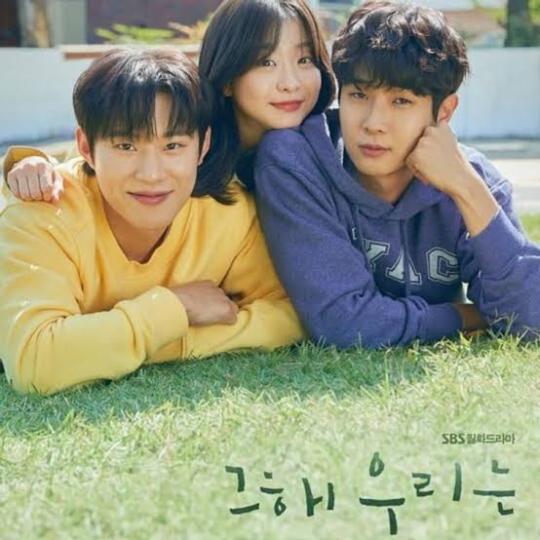
beautiful beautiful men choi woo shik and kim sung cheol played ung bros for life in this beautiful beautiful drama. one of the best handled love triangles ive seen. they were there for each other through thick and thin, and helped each other through sm. best. on the tenth spot because they could've expanded on it more :(
#9 - what's wrong with secretary kim? : lee young joon and park yoo sik

i could never make it through the series. i left it behind on ep9/10 i think, and primarily because i physically cannot digest how emotionless park min young is. BUT, kudos to the hilarious office best bromance by the great park seo joon and kang ki young. ps - why is kang ki young the pankaj tripathi of korean dramas?
#8 - strong girl do bong soon : ahn min hyuk and in gook du

can we ever forget the legendary wink? or the dream where min hyuk is dressed as a woman? i think not. this was more of a frenemy type bromance, united by their love for bong soon and ironically divided by it, too. i refuse to acknowledge this as a love triangle tho. bong soon was astronomical in not hurting gook du and i will not take any criticism. is it a bromance if one of them is pretending to be gay? (and no, we will not discuss any sort of iTs pRoBLeMaTiC debates here.)
#7 - tale of the nine tailed : lee yeon and koo shin ju

don't come at me with the lee rang comments. rang was his half brother, related by blood. their relationship was top tier, but the stay at home husband yeon and working husband shin ju was too cute to not be classified as a bromance. in the beginning, i saw their relationship as shin ju serving yeon, a dynamic that they both seemed to embody. but as the show progresses, yeon baby we know you love shin ju just as much :*
#6 - alchemy of souls : jang uk and seo yul
song joon ki seems to have an attachment to bromances. han seo had the best character arc of the ENTIRE kdrama universe fight me. that court scene where vincenzo pats han seo's cheek was max bro cuteness. still not over his death. he deserved better.
#5 - vincenzo : vincenzo cassano and jang han seo

even though i didn't very much like the show's first couple, bromance delivered well. hospital scene peaked, complete true beauty sameness. it was pretty hard to understand who was the superior officer in this tbh initially, since their comraderie was so cool, shi jin was kid to soldier in a split second. loved how they chose not to unnecessarily exaggerate the love triangle initially bec i was only rooting for the second couple.
#4 - descendants of the sun : yoo shi jin and seo dae young

business proposal was the first kdrama i saw. i finished it in a three day trip, and i remember thinking more about the bromance than the romance. i was NOT used to the clumsiness of kdramas in general, like wattpad fics incarnated. the bromance delivered well, made me root for the second couple, and was the only initial indicator of kang tae moo being human instead of archaeopteryx. that word was a nightmare to spell.
#3 - business proposal : kang tae moo and cha sung hoon
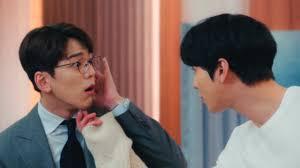
the most wolfstar bromance if I ever saw one. and NO, i do not ship wolfstar just like i do not ship these two. they are totally adorable, and specially since their personalities seemed to switch from when they were children. yeong turned all serious face and lee gon got fun. love their years of friendship sm, their wordless communication and yeong in general. the acting was amazing.
#2 - the king - eternal monarch : lee gon and jo yeong
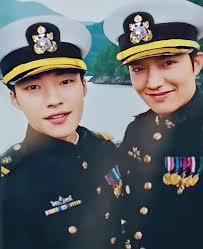
#1 - guardian - the lonely and great god : kim shin aka goblin and wang yeo aka grim reaper

yes, i know I'm missing a lot of iconic ones. unfortunately, i haven't seen alot of kdramas and have left alot in bw (like true beauty bec i couldn't see second lead hurt).
spring onion slays ^
told ya, if u follow me u already knew what the first one was gonna be. being the simp i am for the goblin and grim reaper, these two achieved the max points for their bromance. that slow dynamic of goblin calling reaper's hat tacky to fighting with knives to that iconic 'saranghae' to 'HOW DARE YOU' to goblin boiling eggs with his powers while reaper chills the beer. they know each other so well. love love love them and you should too 🔪
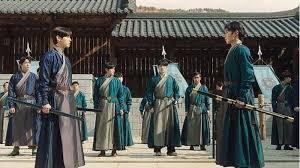
in my heart, the trio of our boys beats nothing (except for the gookdu-minhyuk relationship of the crown prince and uk). but instead of choosing the frenemy thing, i decided to love yul and uk more. yul was such a quiet character, with incredible potential in him for me to hate him, but then...(the guy is literally too sweet and beautiful and nice i can ramble for days). and uk, man, our power baby who loves every version of our beautiful but slow girl, needed so much emotional support. uk and yul were not afraid to show their affection for each other, a trait i admired in all the three boys (jang uk, seo yul and park dang gu).
#kdrama#korean drama#kdrama review#review#lee dong wook#goblin#gong yoo#vincenzo#jang han seo#song joon ki#descendants of the sun#the king eternal monarch#lee gon#jo yeong#our beloved summer#choi ung#choi wooshik#what's wrong with secretary kim#lee young joon#park seo jun#strong girl do bong soon#tale of the nine tailed#lee min ho#lee yeon#alchemy of souls#jang uk#seo yul#business proposal#kang tae moo
113 notes
·
View notes
Text



Elegant Empire (2023)
#elegant empire#kbs elegant empire#elegant empire kbs#2023#kdrama#kbs#우아한 제국#kang yul#강율#han jiwan#han ji wan#한지완
0 notes